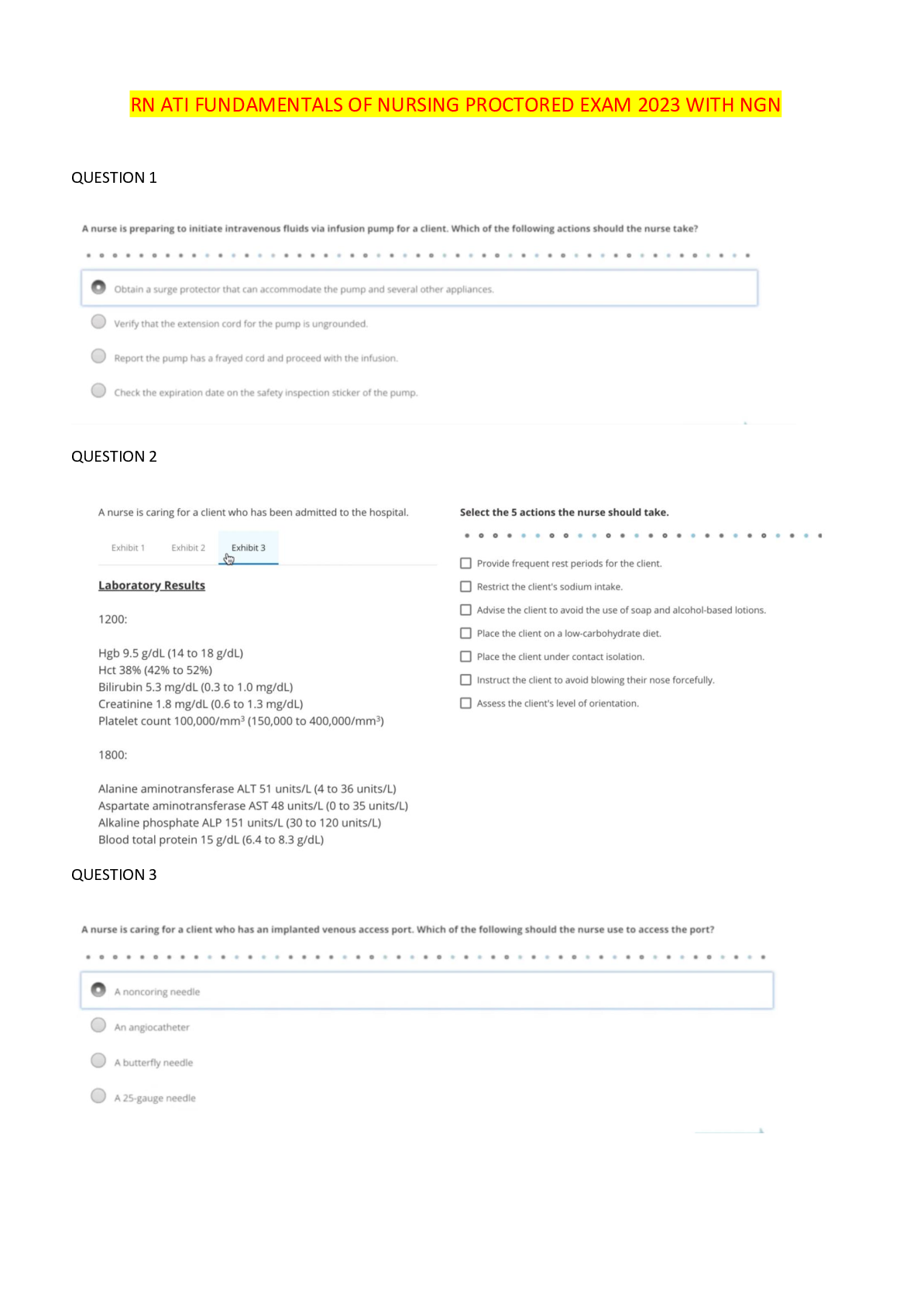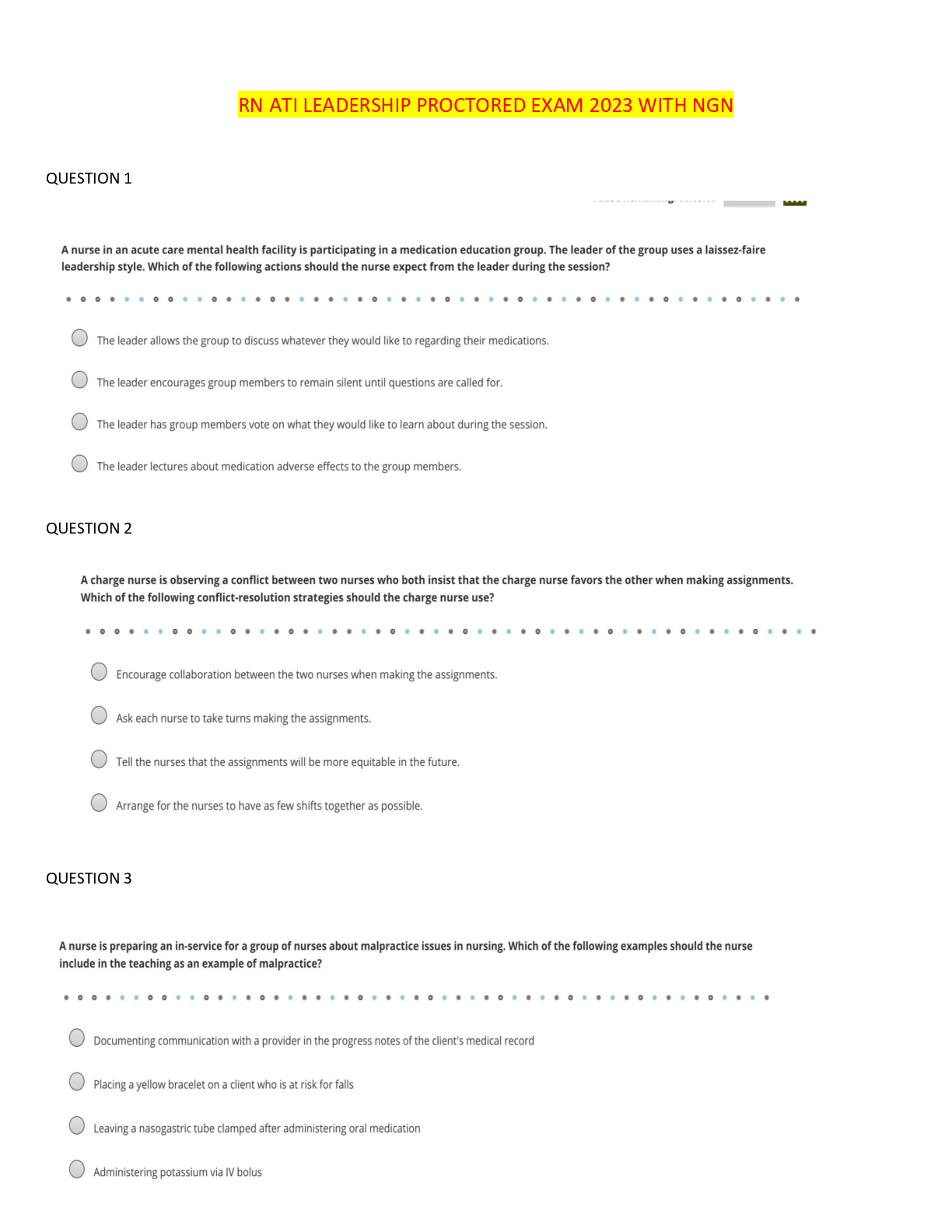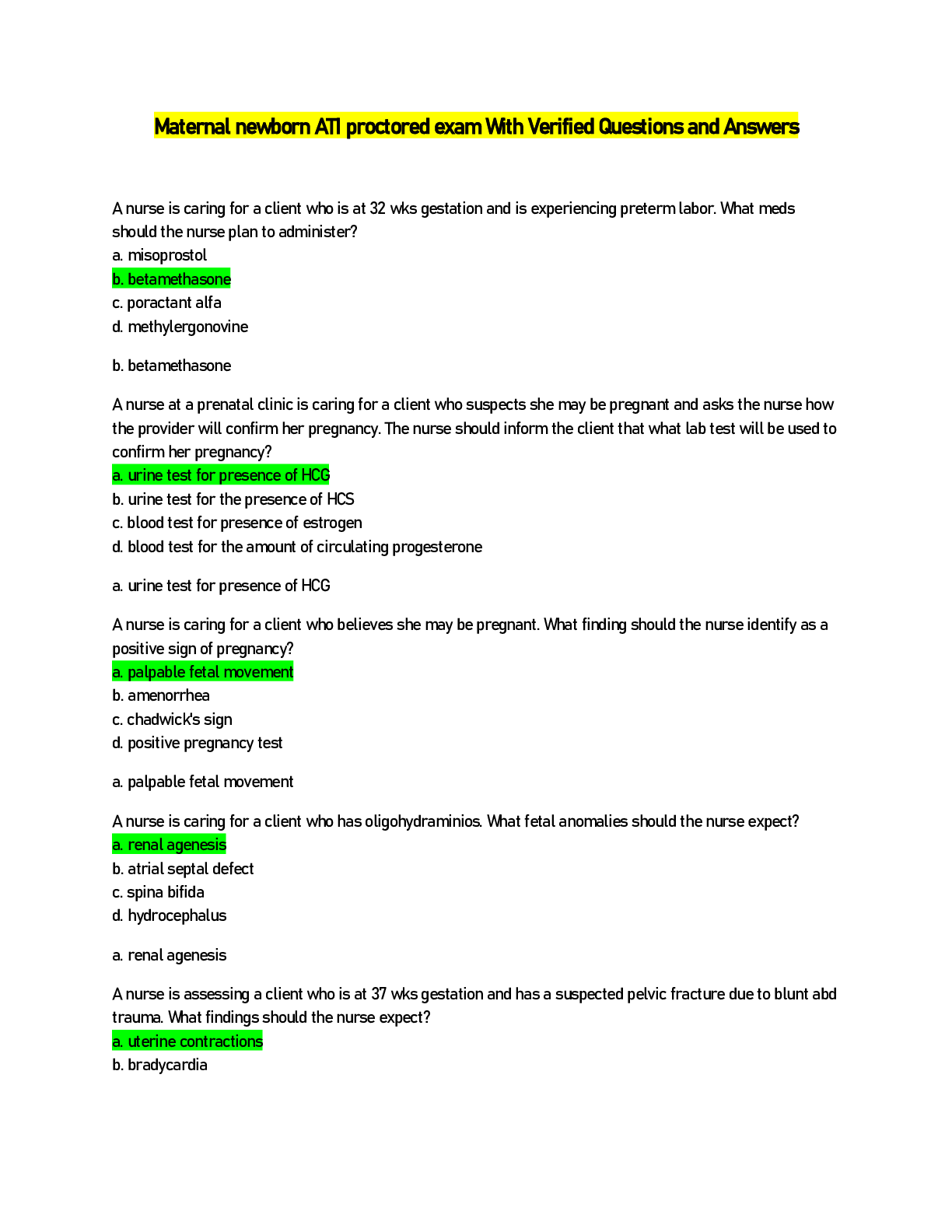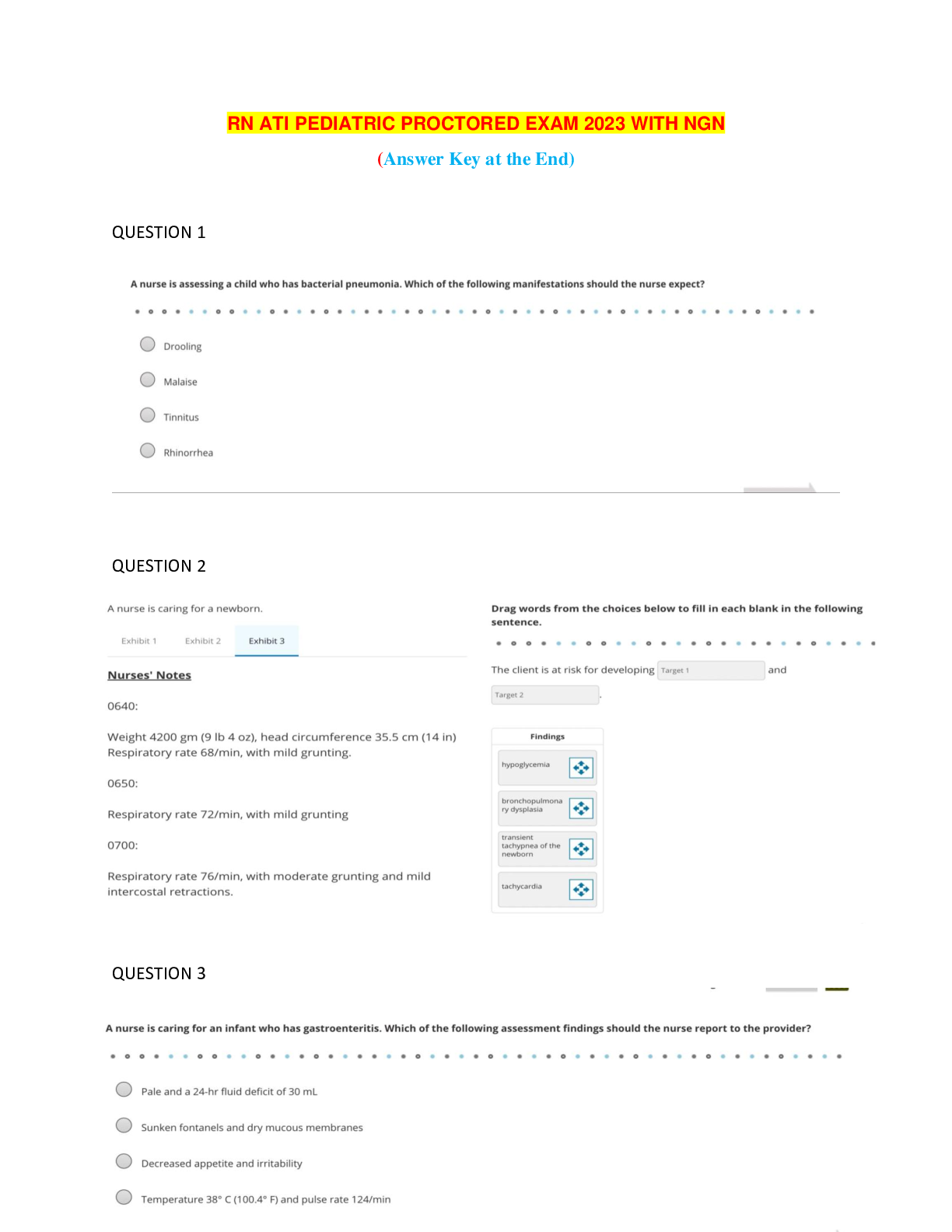*NURSING > ATI > ATI LEADERSHIP PROCTORED EXAM 2023 VERIFIED QUESTIONS AND ANSWERS (GRADED A+) (All)
ATI LEADERSHIP PROCTORED EXAM 2023 VERIFIED QUESTIONS AND ANSWERS (GRADED A+)
Document Content and Description Below
ATI LEADERSHIP PROCTORED EXAM 2023 VERIFIED QUESTIONS AND ANSWERS (GRADED A+) 1.A nurse is preparing an in-service for an annual skills fair at a community medical facility about fire safety. Pla... ce the steps in the order in which they should be performedin the case of a fire emergency. (Move the steps into the box on the right, placing themin the selected order of performance. Use all the steps.) D. Rescue the clients. • Pull the fire alarm. • Confine the fire. • Extinguish the fire. 2.A nurse is caring for a client who is dying of metastatic breast cancer. She has a prescription for an opioid pain medication PRN. The nurse is concerned that administering a dose of pain medication might hasten the client's death. Which of the following ethical principles should the nurse use to support the decision not to administerthe medication? • Utilitarianism Rationale:Utilitarianism refers to actions that are right when they contribute to the greatestgood. B. Nonmaleficence Rationale:Nonmaleficence is the duty to do no harm. The ethical mandate of nonmaleficence is that health care workers refrain from intentionally inflicting harm to clients. • Fidelity Rationale:Fidelity is the duty to keep one's promises or word. It refers to the obligation tobe faithful to the agreements, commitments, and responsibilities that one has made to oneself and others. • Veracity Rationale:Veracity is the duty to tell the truth. It means that one does not intentionallydeceive or mislead clients. 3.A charge nurse notes that a staff nurse delegates an unfair share of tasks to the assistivepersonnel (AP) and the nurses on next shift report the staff nurse frequently leaves tasks uncompleted. Which of the following statements should the charge nurse make to resolve this conflict? A. "I need to talk to you about unit expectations regarding delegating and completing tasks." Rationale:This statement opens the conversation in a nonthreatening way. The focus is on the issue of the equity of the assignment rather than on any personal characteristic of the individual. • "Several staff members have commented that you don't do your fair share of thework." Rationale:This statement is accusatory. • "If you don't do your share of the work, I will have to inform the nurse manager." Rationale:This statement is punitive. • "You have been very inconsiderate of others by not completing your share of thework." Rationale:This statement is punitive. • A nurse is providing care for a surgeon on a medical-surgical unit. A nurse from anotherunit asks the nurse about the surgeon’s medical diagnosis. The nurse responds that he is unable to provide the information requested. The nurse is displaying which of the followingethical principles? • Utility Rationale:Utility is the ethical principle that the good of many people outweighs the good of one person. • Paternalism Rationale:Paternalism is the belief that one individual has the right to makedecisions for another. It negates the client’s right to autonomy. C. Justice Rationale:Justice is the ethical principled based on the belief that everyone should betreated fairly. D. Nonmaleficence Rationale:The nurse is obligated to protect the client’s confidential information. A breach ofconfidentiality can place the client at risk of harm. Nonmaleficence is the ethical duty to prevent harm to the client. • When planning delegation of tasks to assistive personnel (AP), a nurse considers the five rights of delegation. Which of the following should the nurse consider when using oneof the five rights of delegation? • The AP's ability to prioritize Rationale:Although the nurse could determine the AP’s ability to prioritize, this is not one of the rights of delegation. B. The AP has the knowledge and skill to perform the task Rationale:The right person is one of the five rights of delegation. The nurse should seek information from the AP about his individual skill level before delegating the task. • The AP's rapport with clients Rationale:Although a positive rapport with clients is important, this is not one of the fiverights of delegation. • The AP’s ability to complete the taskwithout assistance Rationale: The nurse does not relinquish accountability for supervising the AP; therefore, this is notone of the five rights of delegation. • While caring for a client, the nurse experiences a needle stick injury. Which of thefollowing actions should the nurse take first? • Complete an incident report. Rationale:The nurse should complete an incident report; however, there is another action the nurse should take first. B. Request the risk manager obtain consent for HIV testingfrom the client. Rationale:Although it is important that the client’s HIV status is determined, there is another action the nurse should take first. C. Wash the site of injury with soap and water. Rationale:The greatest risk to the nurse is infection transmission; therefore, the nurseshould first wash the area with soap and water to reduce the risk of transmission. D. Consent to postexposure treatment with antiretroviral medications. 1.A nurse is preparing an in-service for an annual skills fair at a community medical facility about fire safety. Place the steps in the order in which they should be performedin the case of a fire emergency. (Move the steps into the box on the right, placing themin the selected order of performance. Use all the steps.) D. Rescue the clients. • Pull the fire alarm. • Confine the fire. • Extinguish the fire. 2.A nurse is caring for a client who is dying of metastatic breast cancer. She has a prescription for an opioid pain medication PRN. The nurse is concerned that administering a dose of pain medication might hasten the client's death. Which of the following ethical principles should the nurse use to support the decision not to administerthe medication? • Utilitarianism Rationale:Utilitarianism refers to actions that are right when they contribute to the greatestgood. B. Nonmaleficence Rationale:Nonmaleficence is the duty to do no harm. The ethical mandate of nonmaleficence is that health care workers refrain from intentionally inflicting harm to clients. • Fidelity Rationale:Fidelity is the duty to keep one's promises or word. It refers to the obligation tobe faithful to the agreements, commitments, and responsibilities that one has made to oneself and others. • Veracity Rationale:Veracity is the duty to tell the truth. It means that one does not intentionallydeceive or mislead clients. 3.A charge nurse notes that a staff nurse delegates an unfair share of tasks to the assistivepersonnel (AP) and the nurses on next shift report the staff nurse frequently leaves tasks uncompleted. Which of the following statements should the charge nurse make to resolve this conflict? A. "I need to talk to you about unit expectations regarding delegating and completing tasks." Rationale:This statement opens the conversation in a nonthreatening way. The focus is on the issue of the equity of the assignment rather than on any personal characteristic of the individual. • "Several staff members have commented that you don't do your fair share of thework." Rationale:This statement is accusatory. • "If you don't do your share of the work, I will have to inform the nurse manager." Rationale:This statement is punitive. • "You have been very inconsiderate of others by not completing your share of thework." Rationale:This statement is punitive. • A nurse is providing care for a surgeon on a medical-surgical unit. A nurse from anotherunit asks the nurse about the surgeon’s medical diagnosis. The nurse responds that he is unable to provide the information requested. The nurse is displaying which of the followingethical principles? • Utility Rationale:Utility is the ethical principle that the good of many people outweighs the good of one person. • Paternalism Rationale:Paternalism is the belief that one individual has the right to makedecisions for another. It negates the client’s right to autonomy. C. Justice Rationale:Justice is the ethical principled based on the belief that everyone should betreated fairly. D. Nonmaleficence Rationale:The nurse is obligated to protect the client’s confidential information. A breach ofconfidentiality can place the client at risk of harm. Nonmaleficence is the ethical duty to prevent harm to the client. • When planning delegation of tasks to assistive personnel (AP), a nurse considers the five rights of delegation. Which of the following should the nurse consider when using oneof the five rights of delegation? • The AP's ability to prioritize Rationale:Although the nurse could determine the AP’s ability to prioritize, this is not one of the rights of delegation. B. The AP has the knowledge and skill to perform the task Rationale:The right person is one of the five rights of delegation. The nurse should seek information from the AP about his individual skill level before delegating the task. • The AP's rapport with clients Rationale:Although a positive rapport with clients is important, this is not one of the fiverights of delegation. • The AP’s ability to complete the taskwithout assistance Rationale: The nurse does not relinquish accountability for supervising the AP; therefore, this is notone of the five rights of delegation. • While caring for a client, the nurse experiences a needle stick injury. Which of thefollowing actions should the nurse take first? • Complete an incident report. Rationale:The nurse should complete an incident report; however, there is another action the nurse should take first. B. Request the risk manager obtain consent for HIV testingfrom the client. Rationale:Although it is important that the client’s HIV status is determined, there is another action the nurse should take first. C. Wash the site of injury with soap and water. Rationale:The greatest risk to the nurse is infection transmission; therefore, the nurseshould first wash the area with soap and water to reduce the risk of transmission. D. Consent to postexposure treatment with antiretroviral medications. [Show More]
Last updated: 1 year ago
Preview 1 out of 13 pages
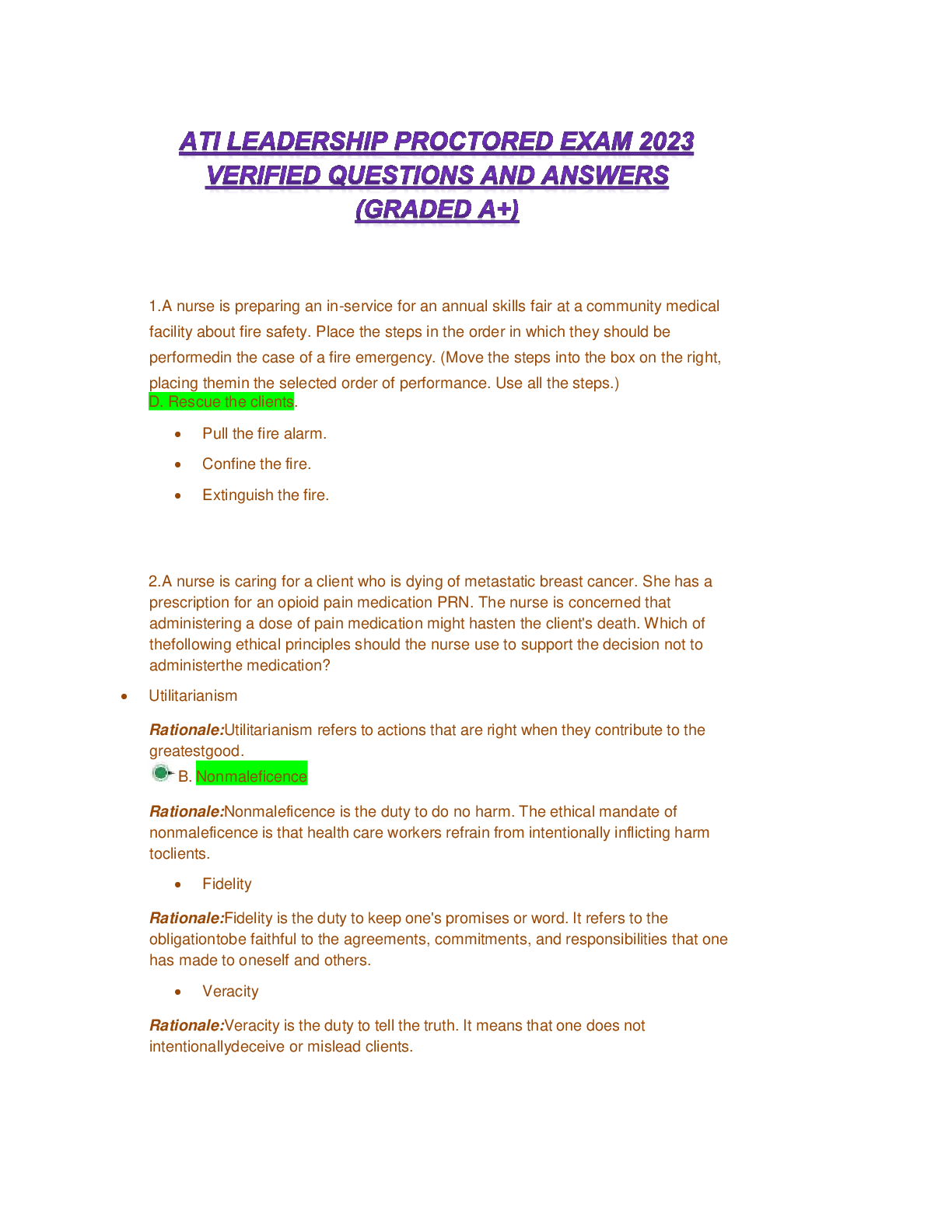
Reviews( 0 )
Document information
Connected school, study & course
About the document
Uploaded On
Feb 23, 2023
Number of pages
13
Written in
Additional information
This document has been written for:
Uploaded
Feb 23, 2023
Downloads
0
Views
29

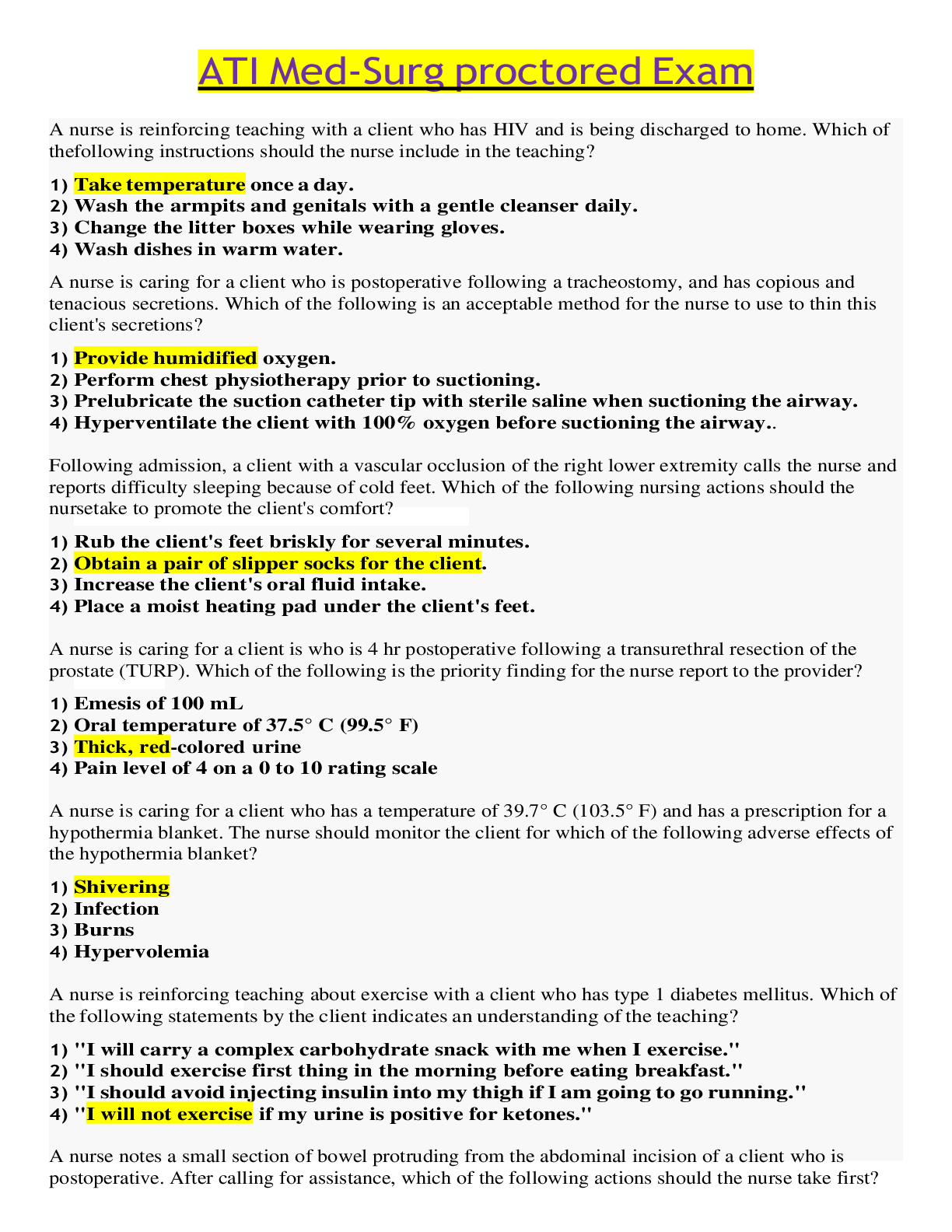
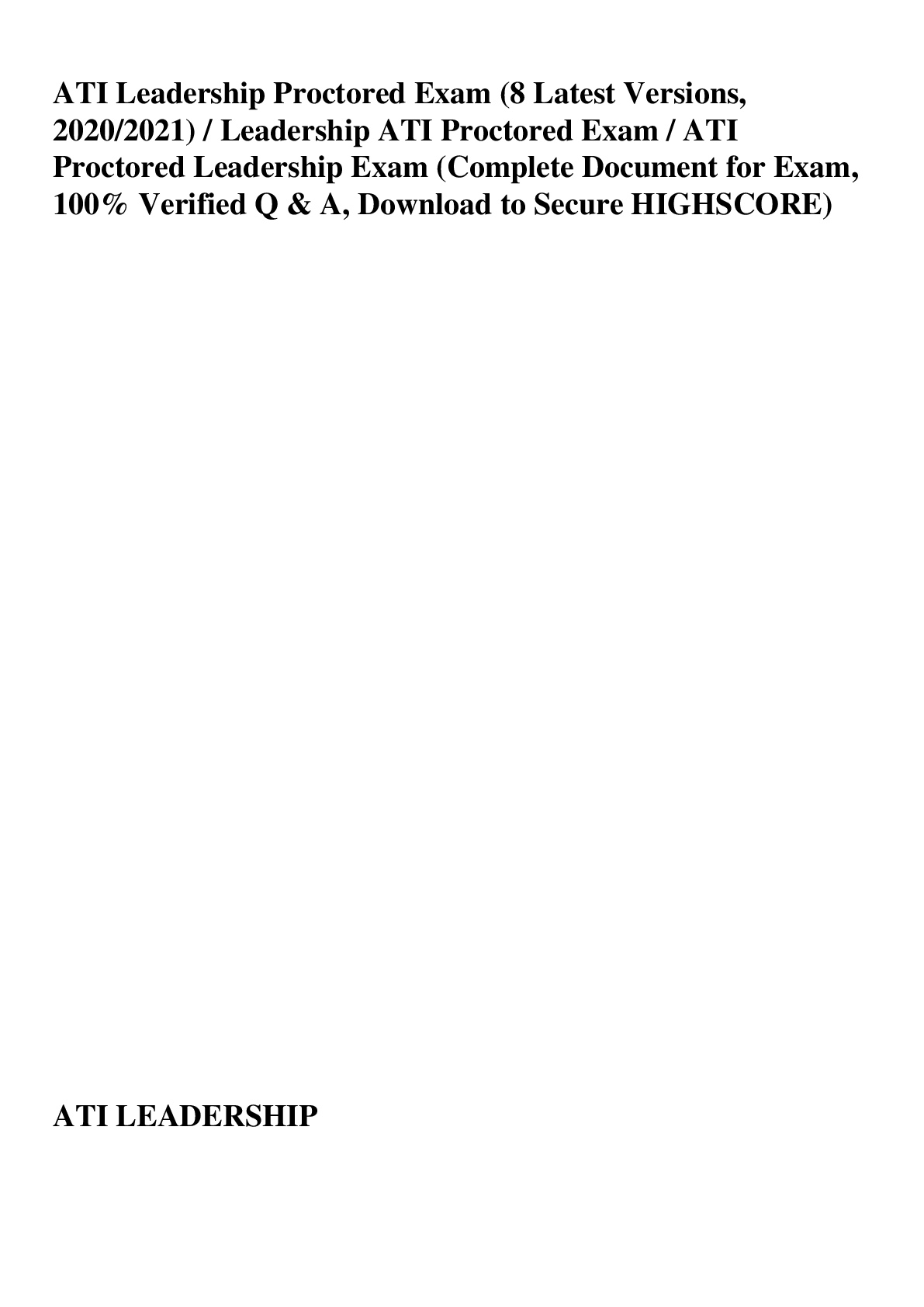
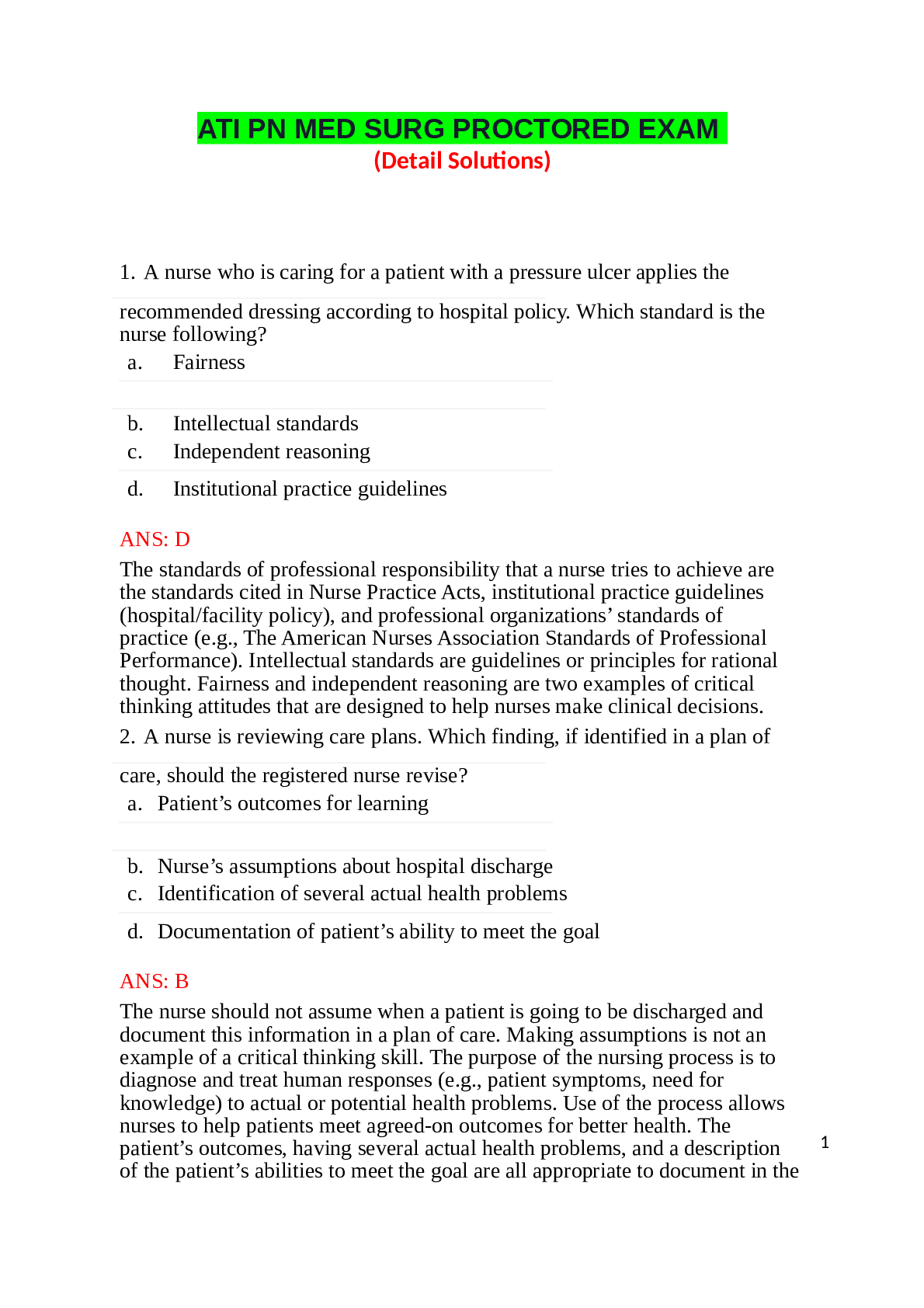
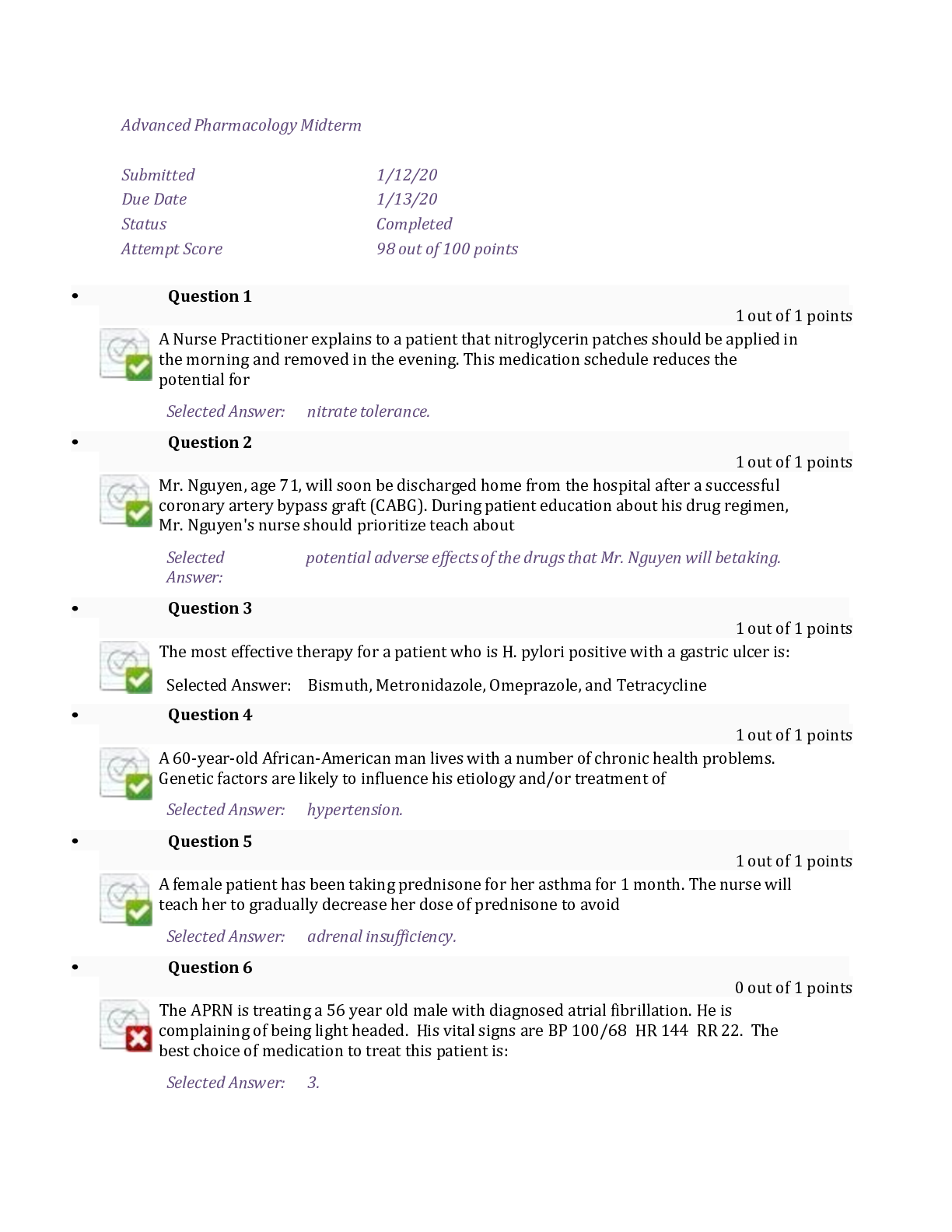
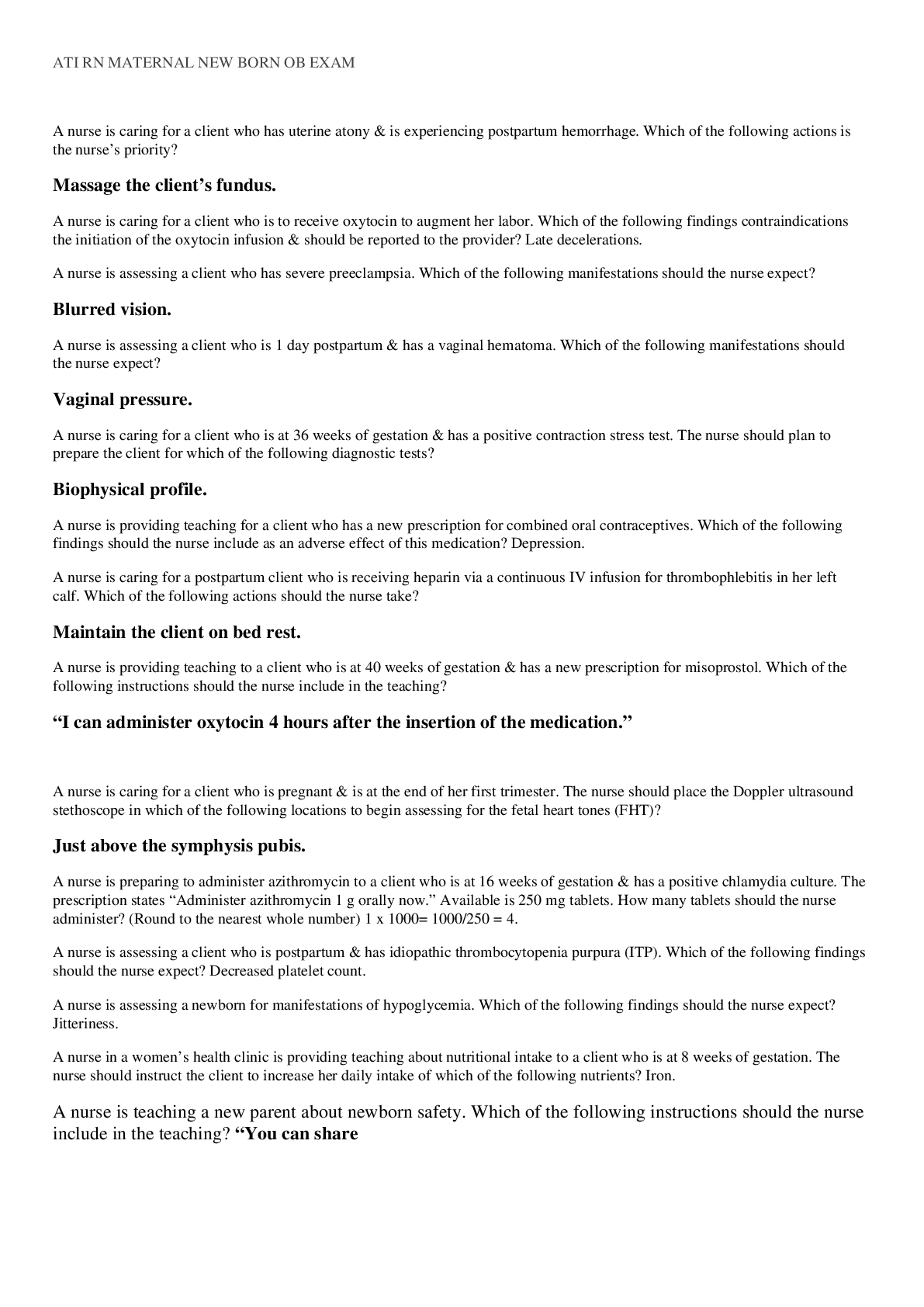
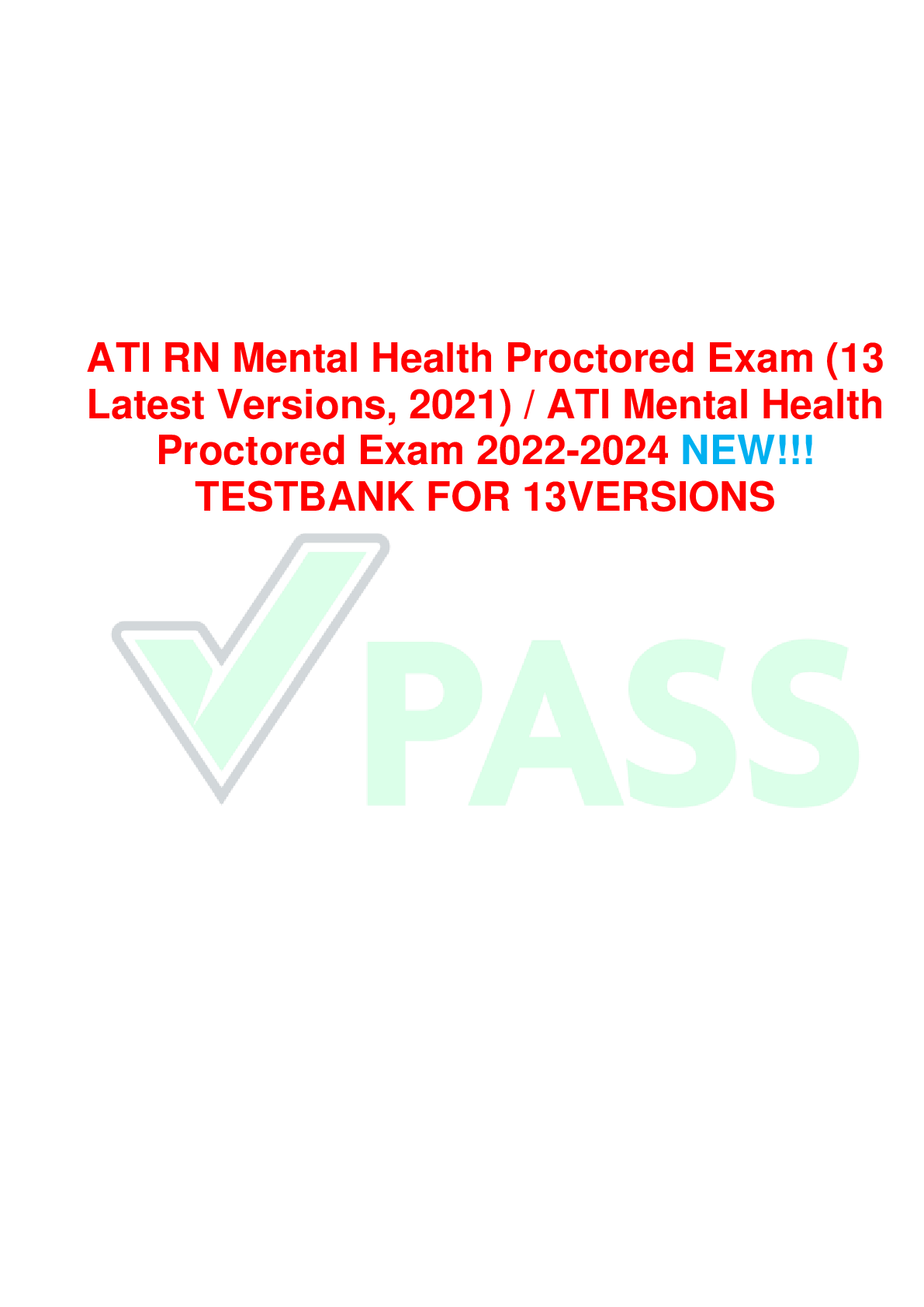
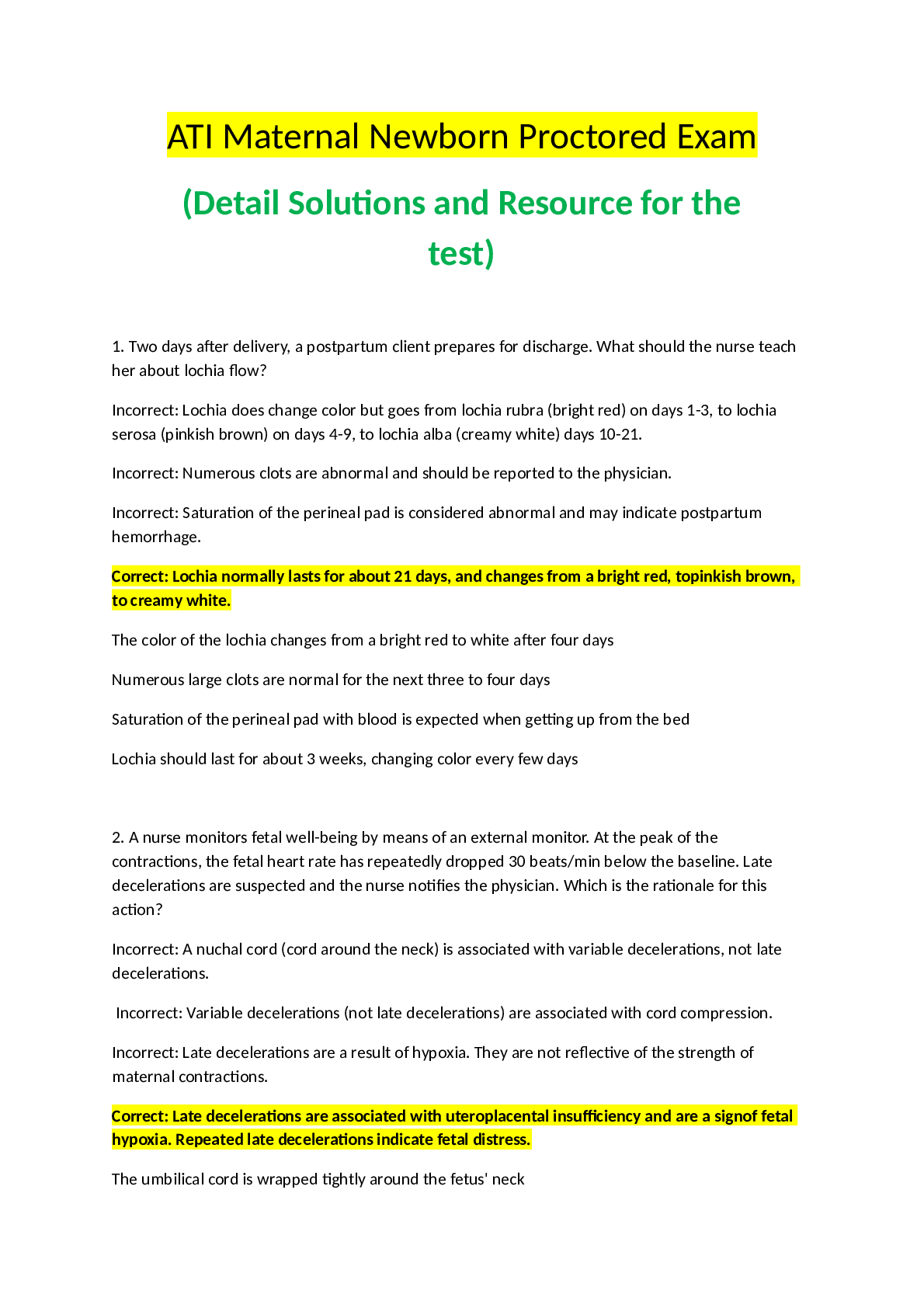
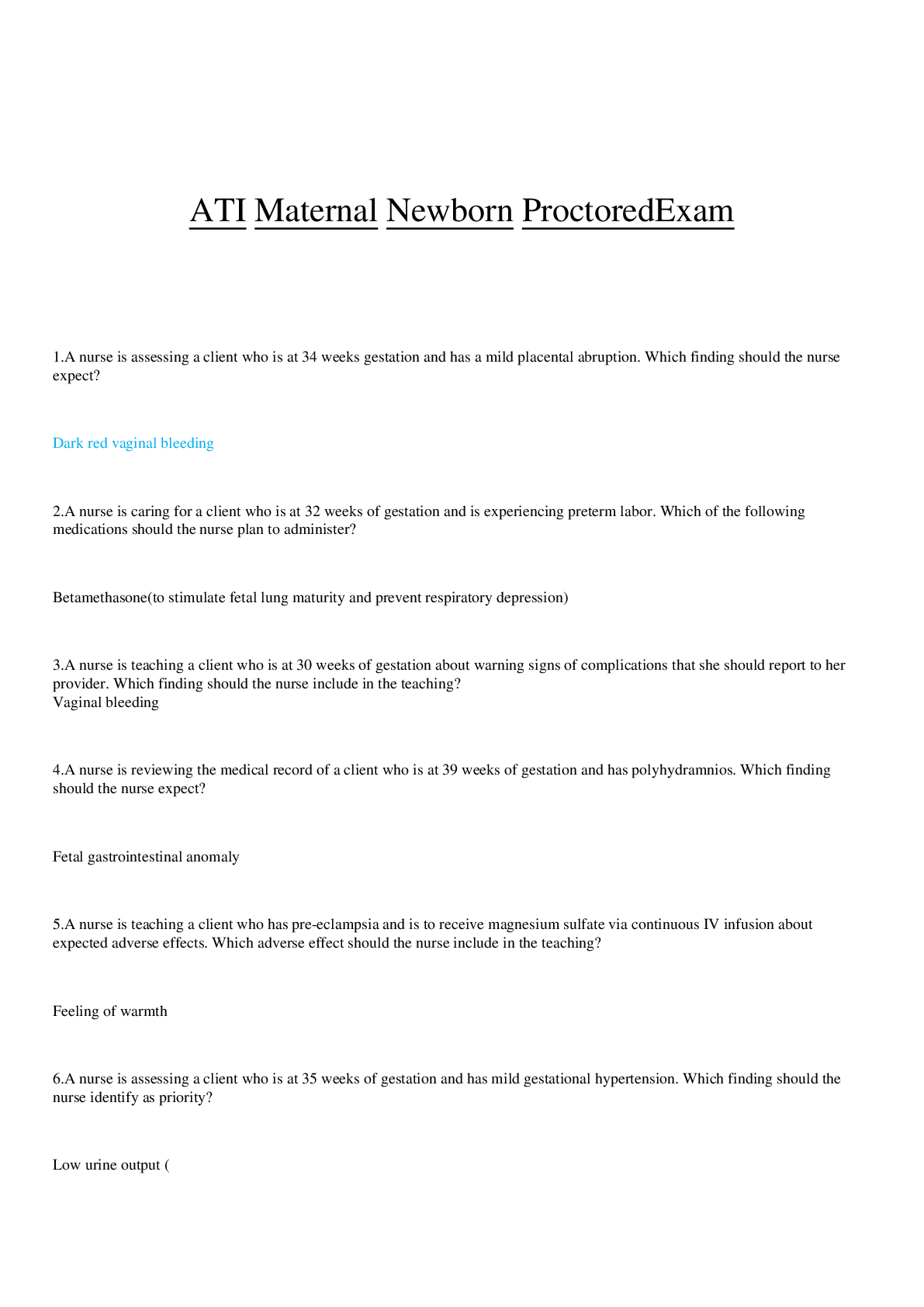
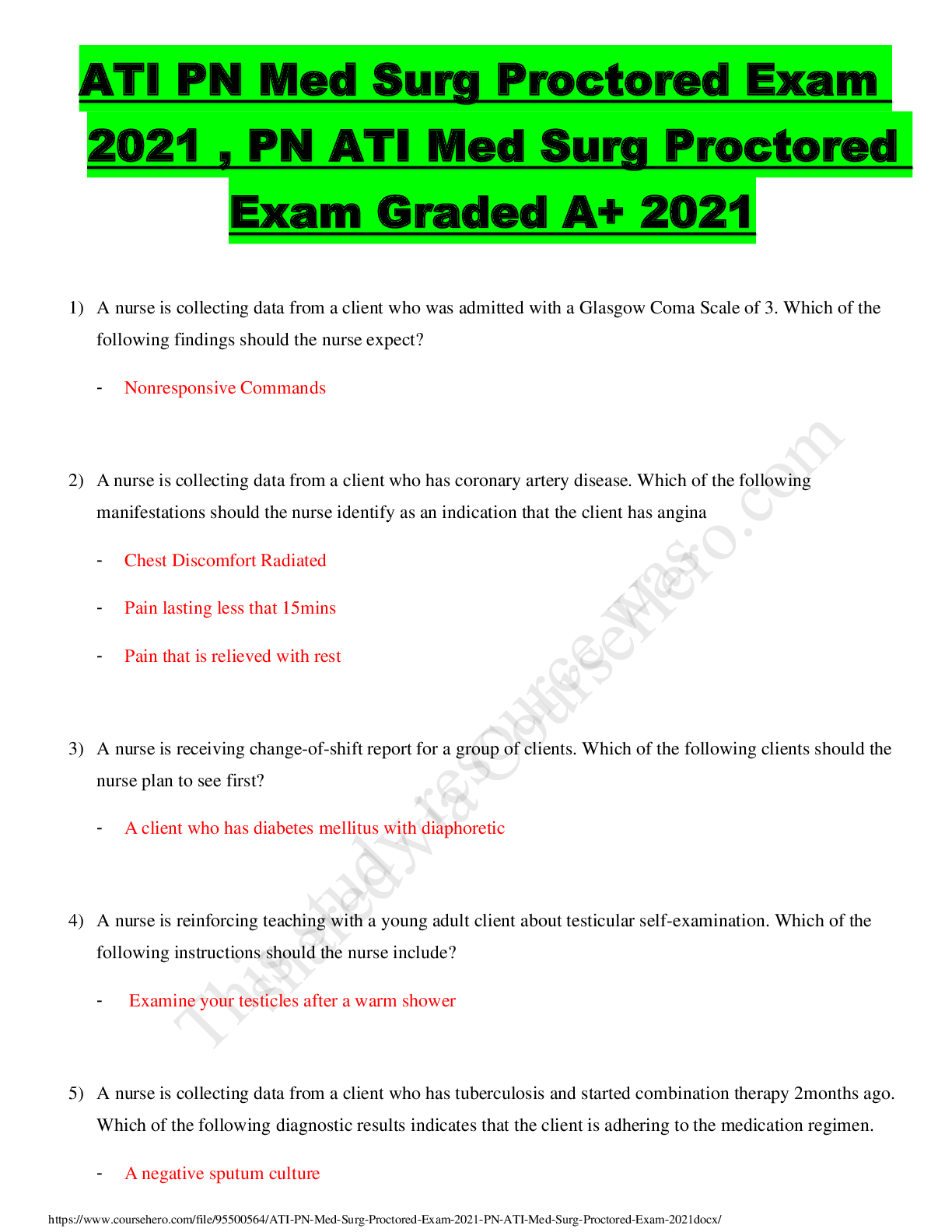
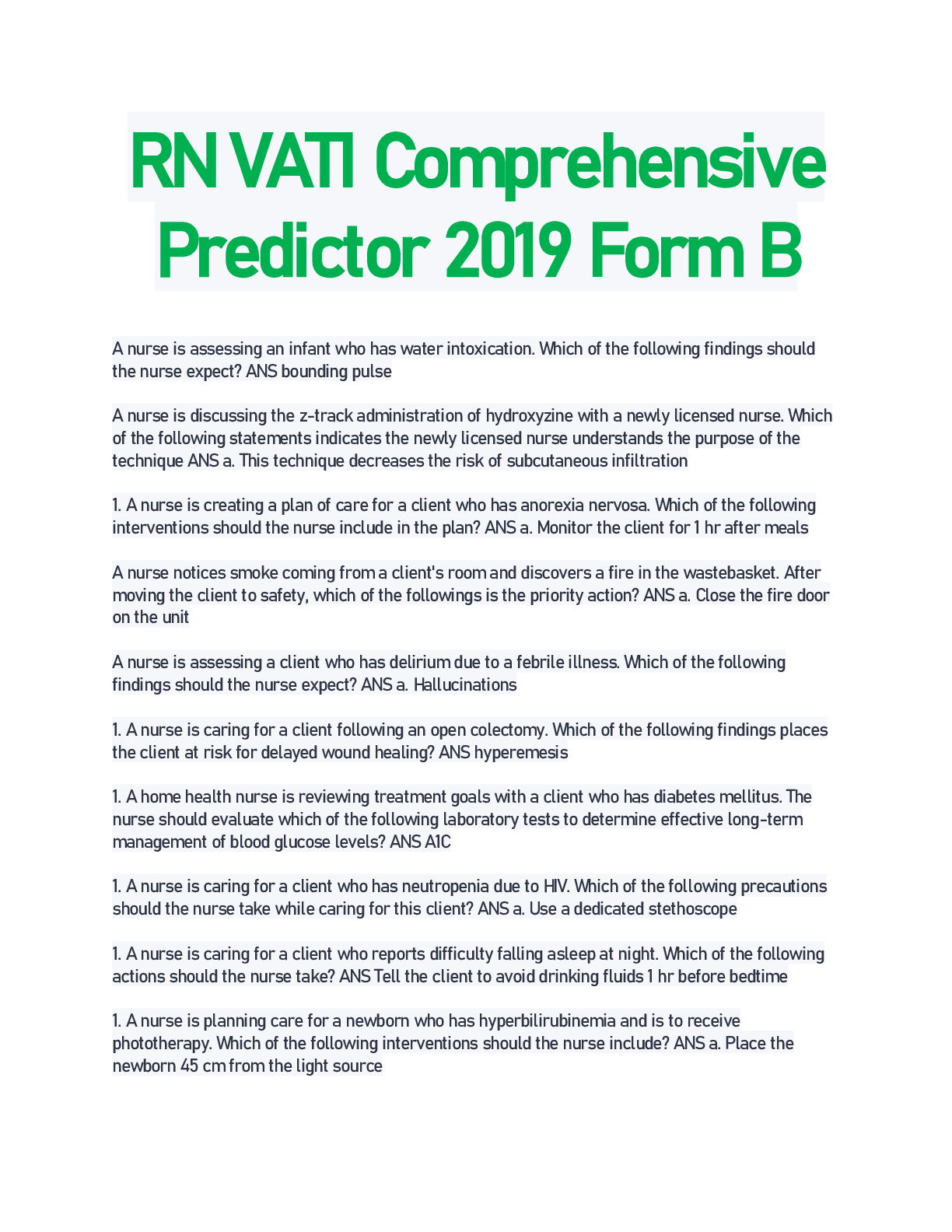
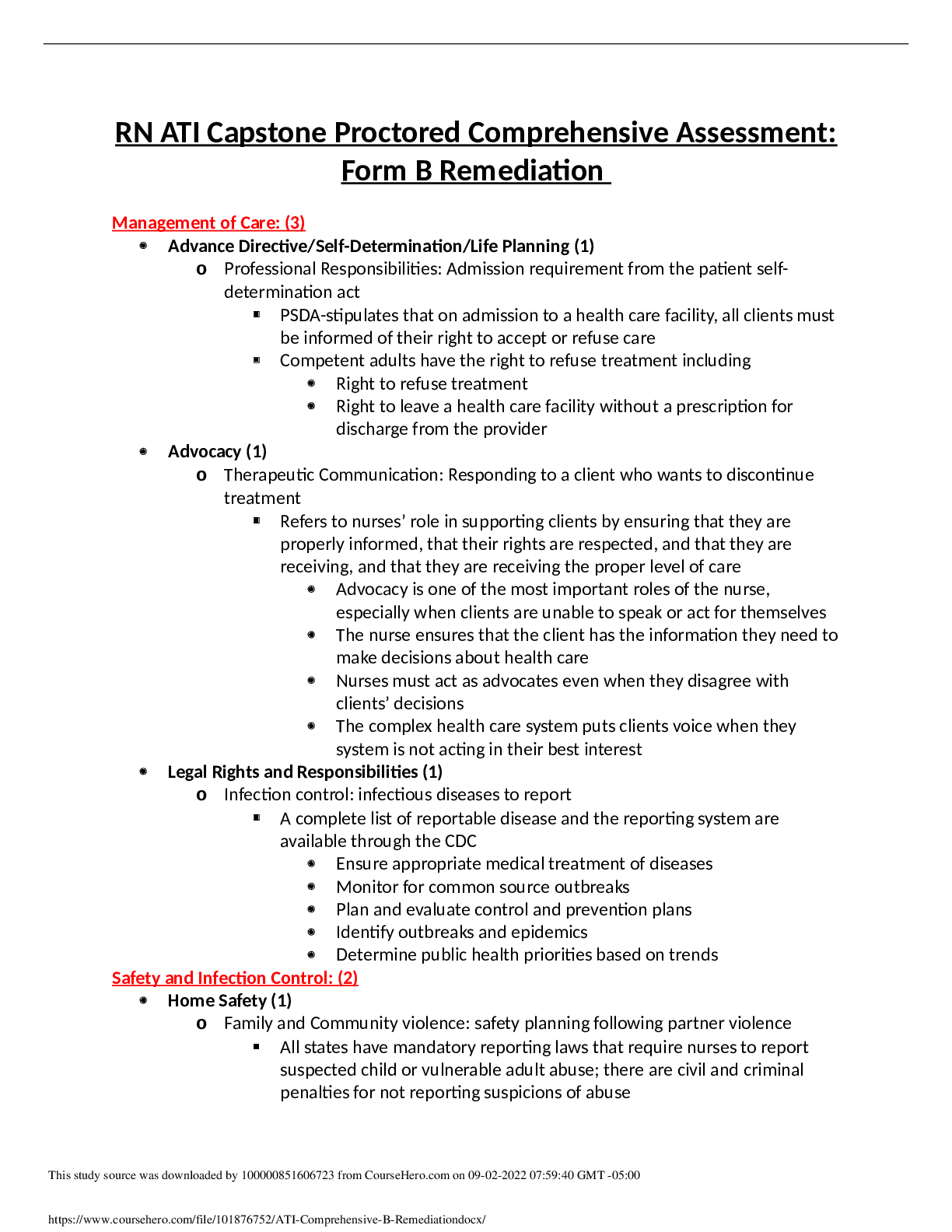

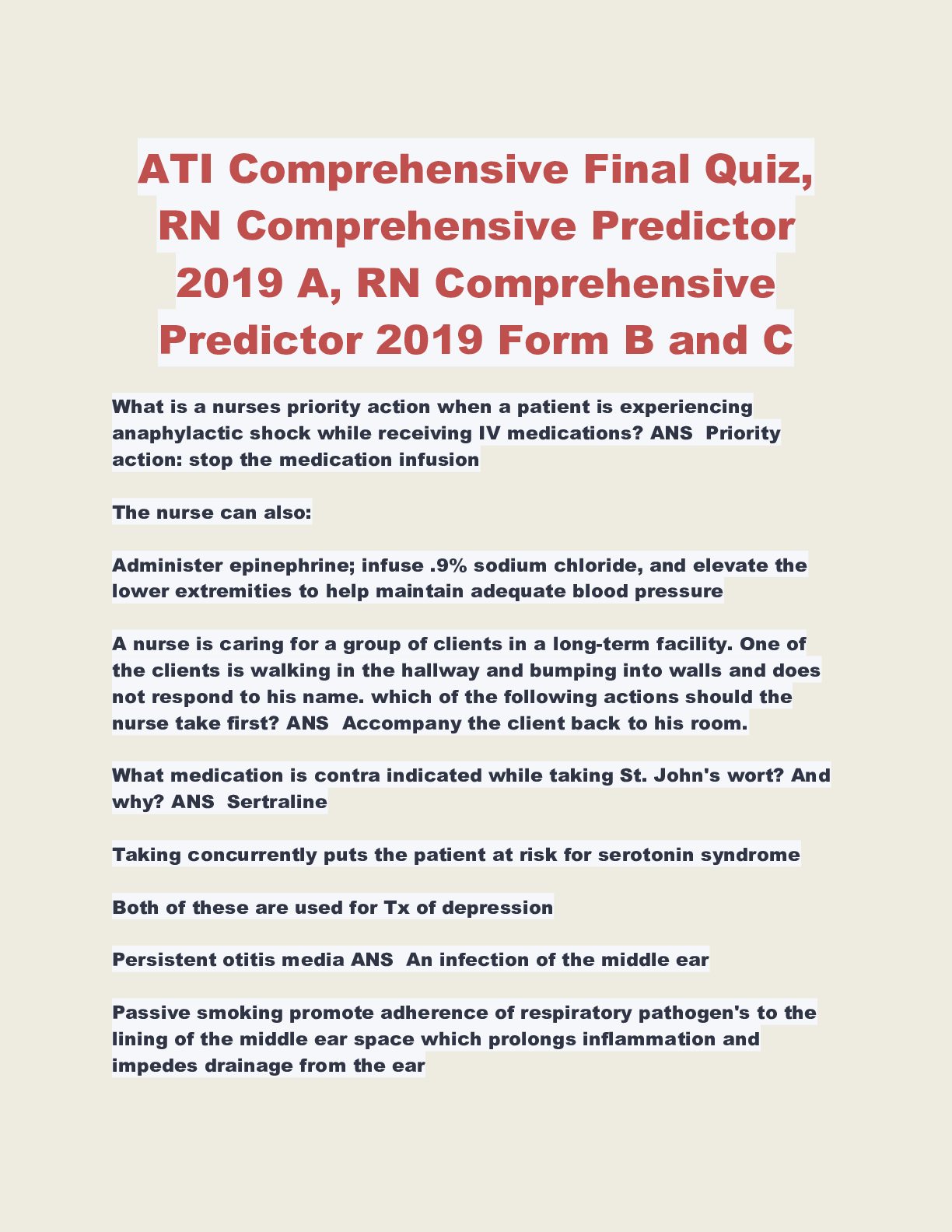
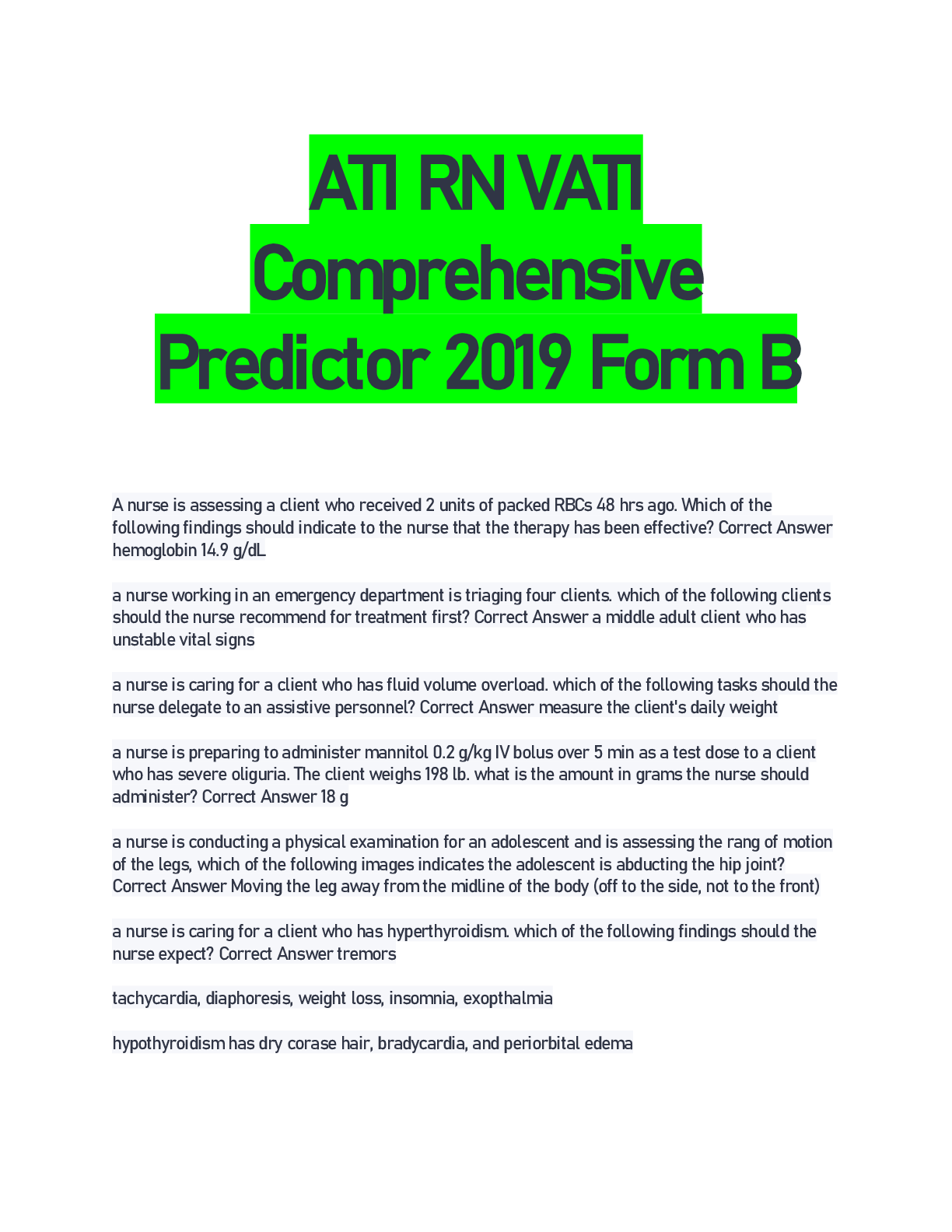
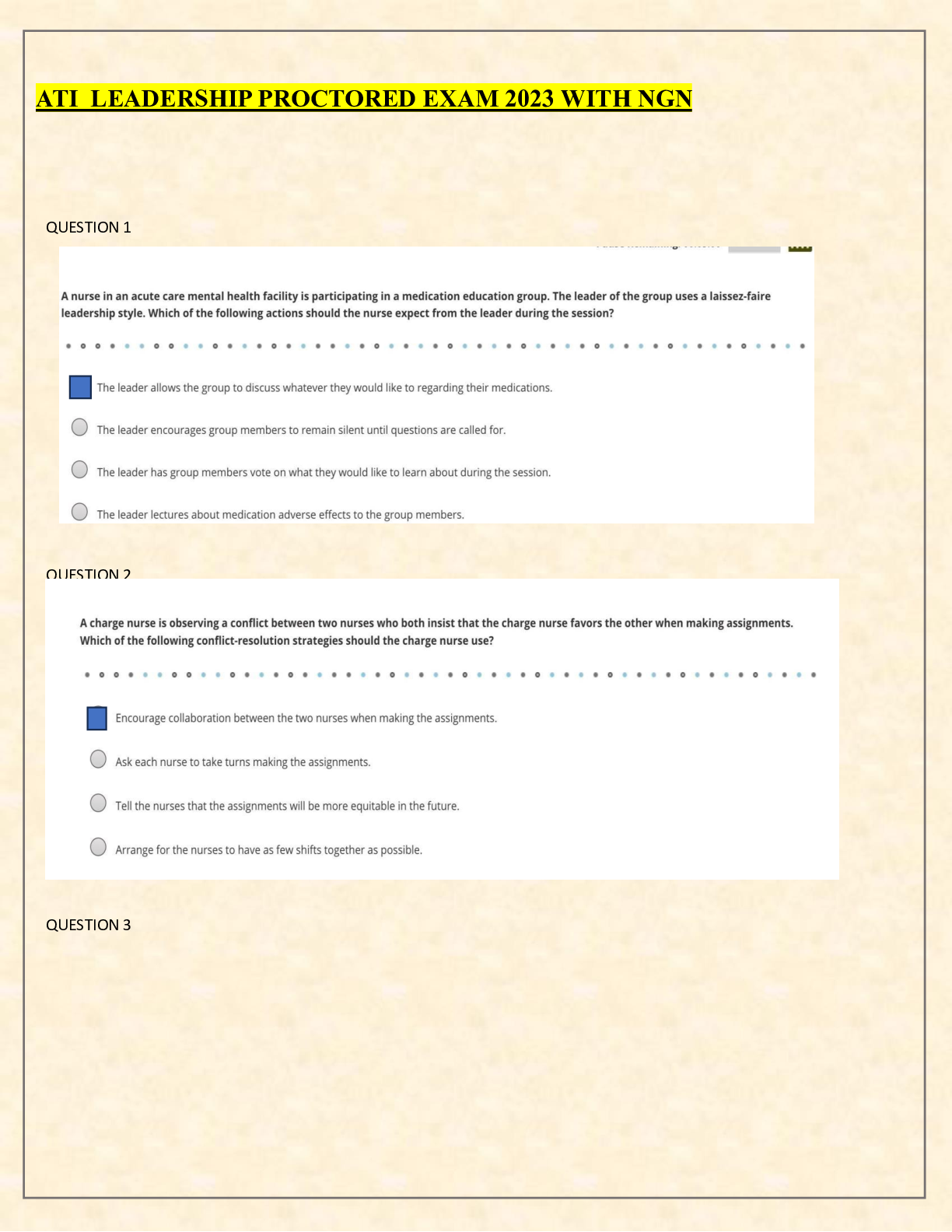
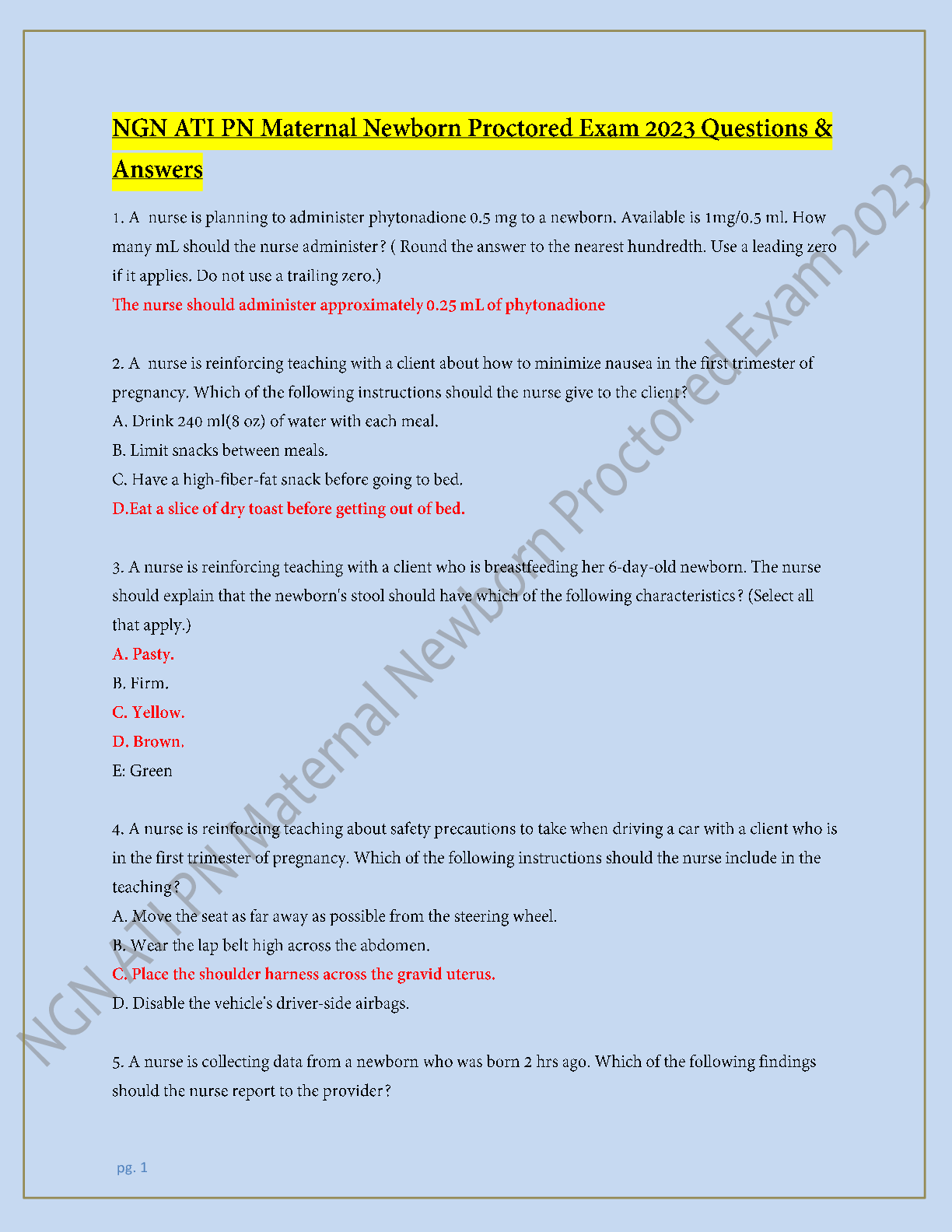
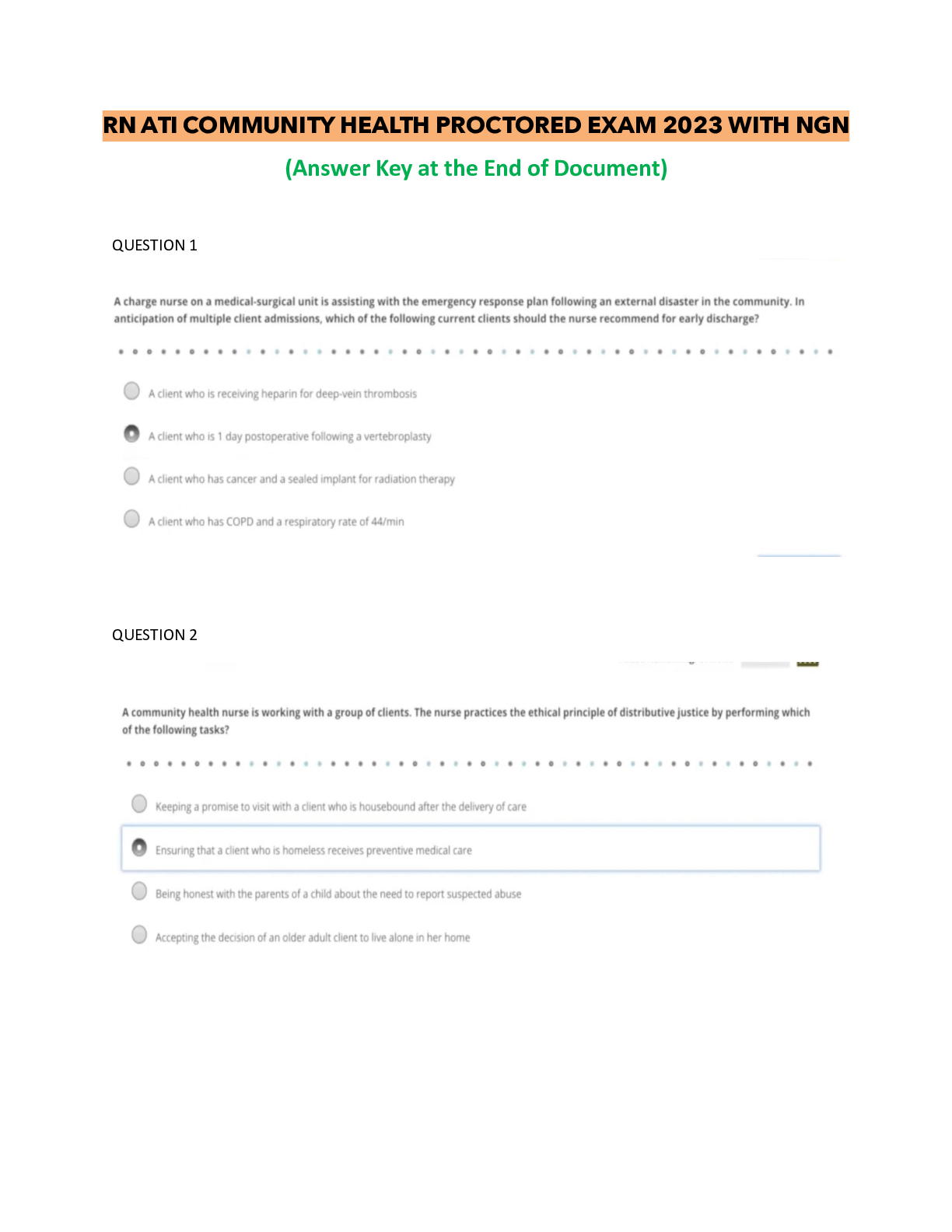
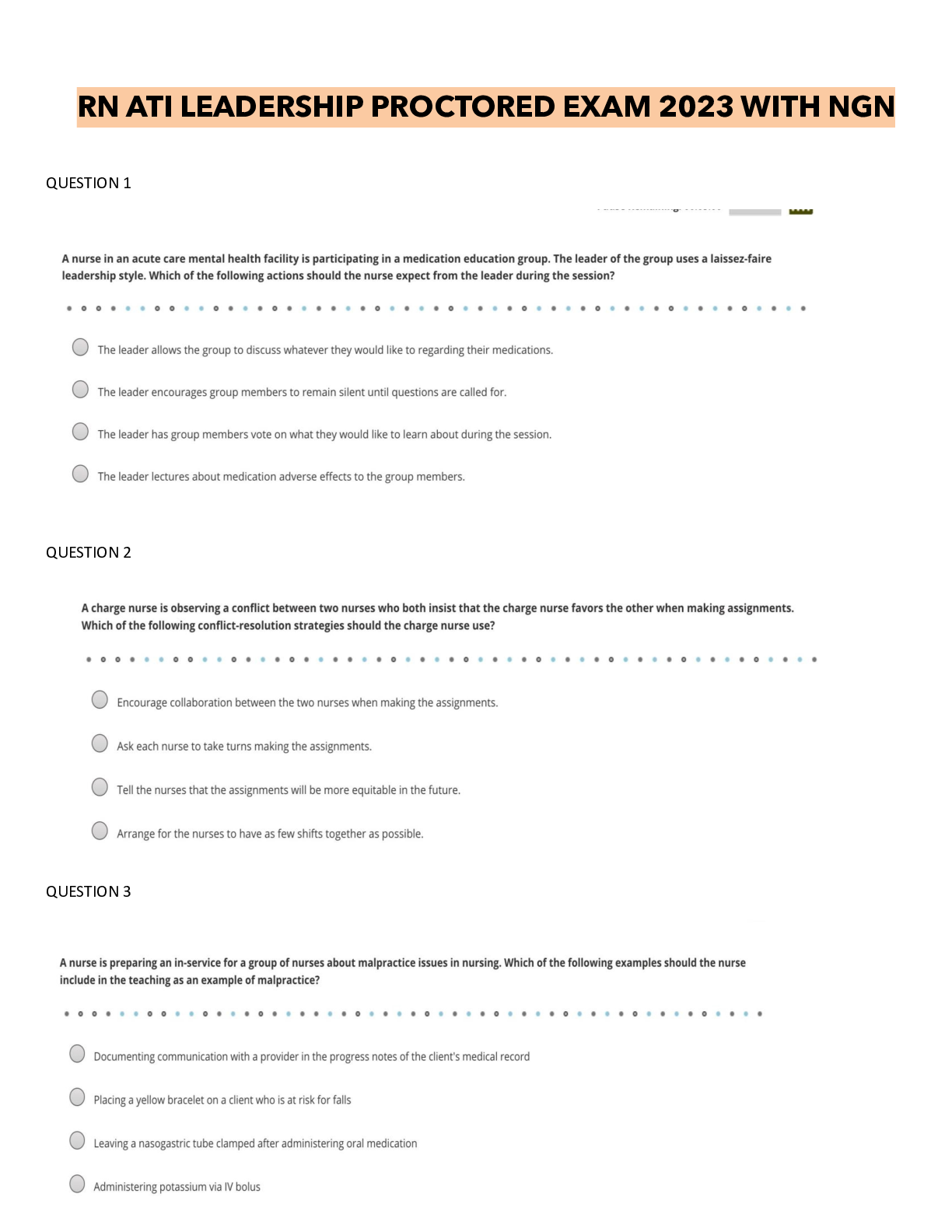
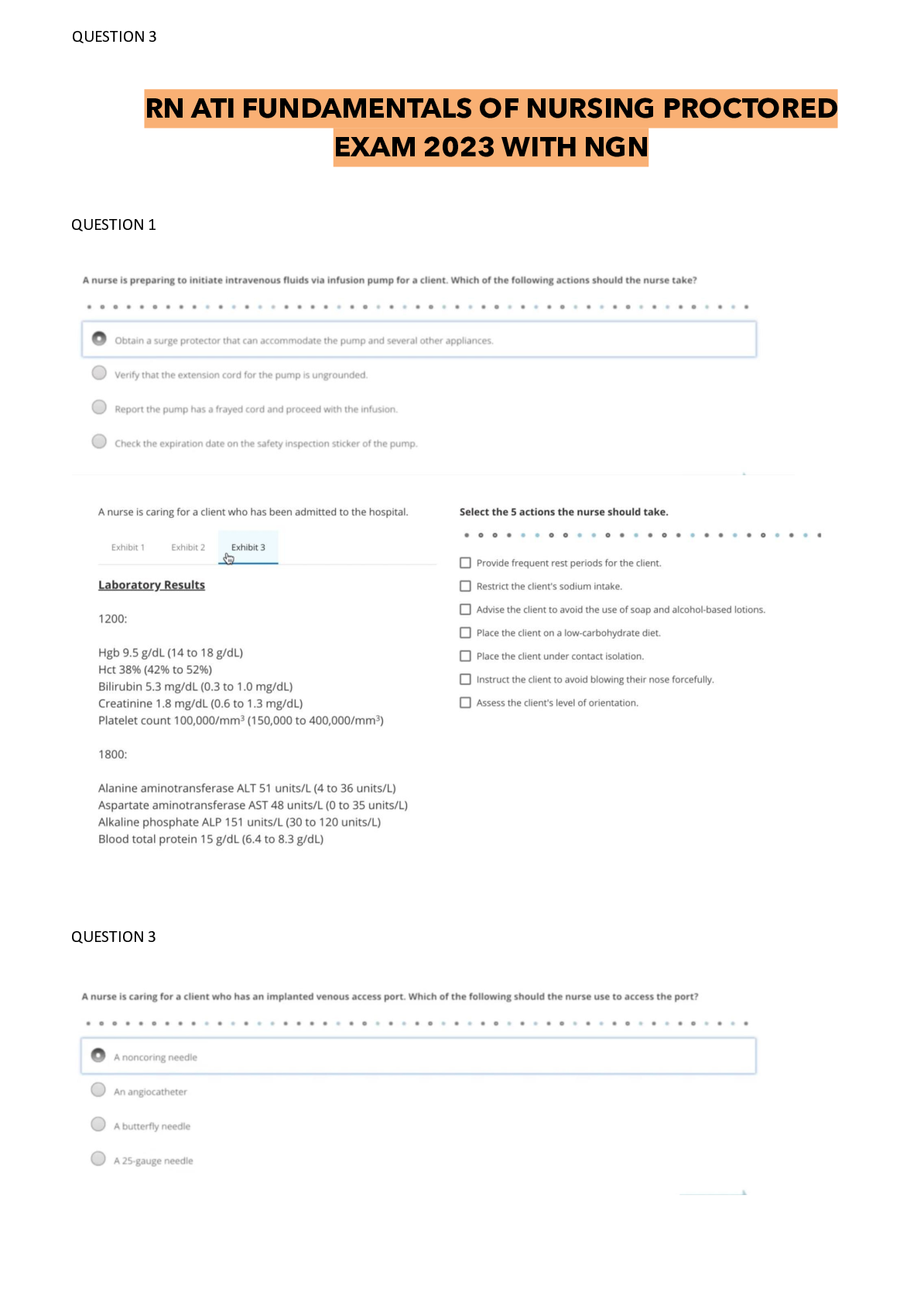
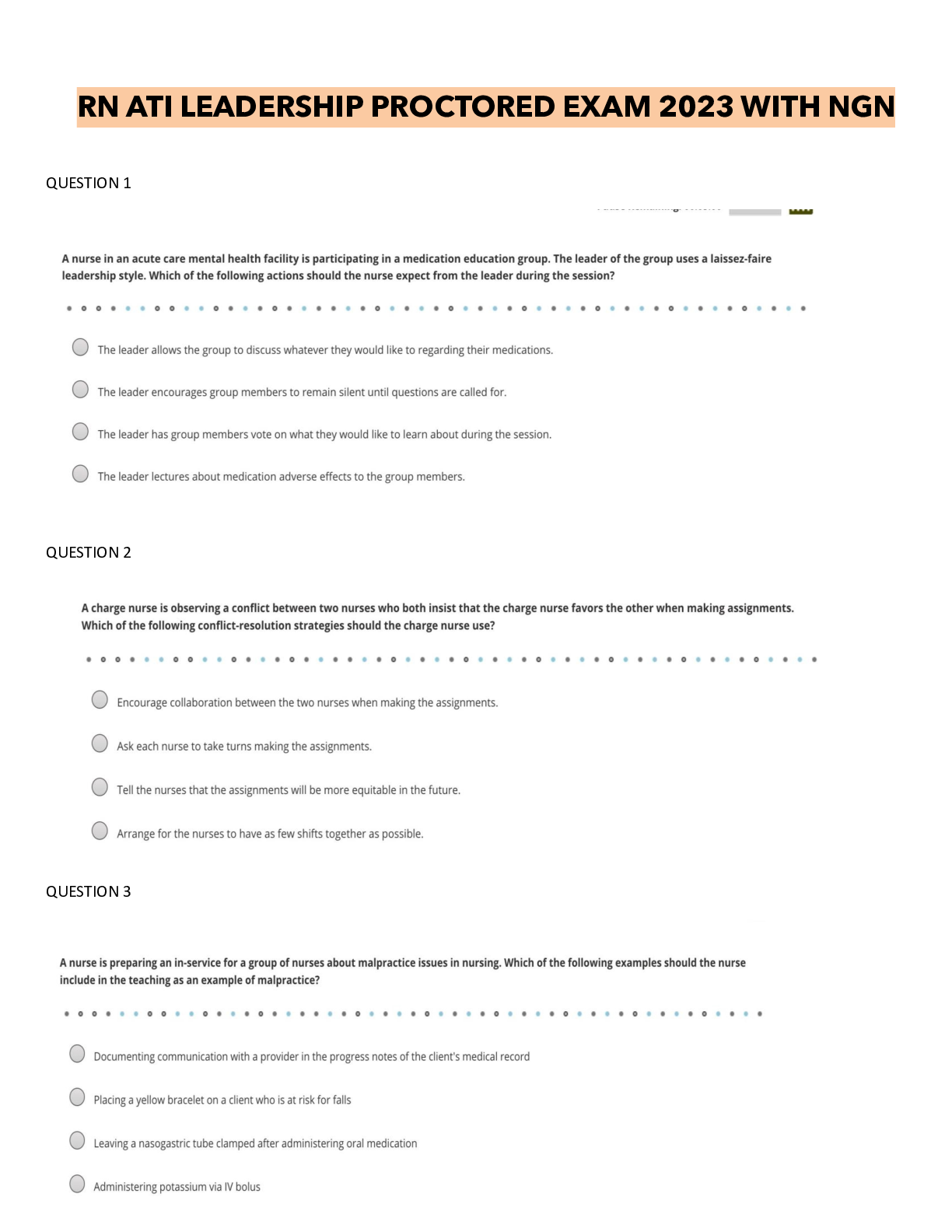

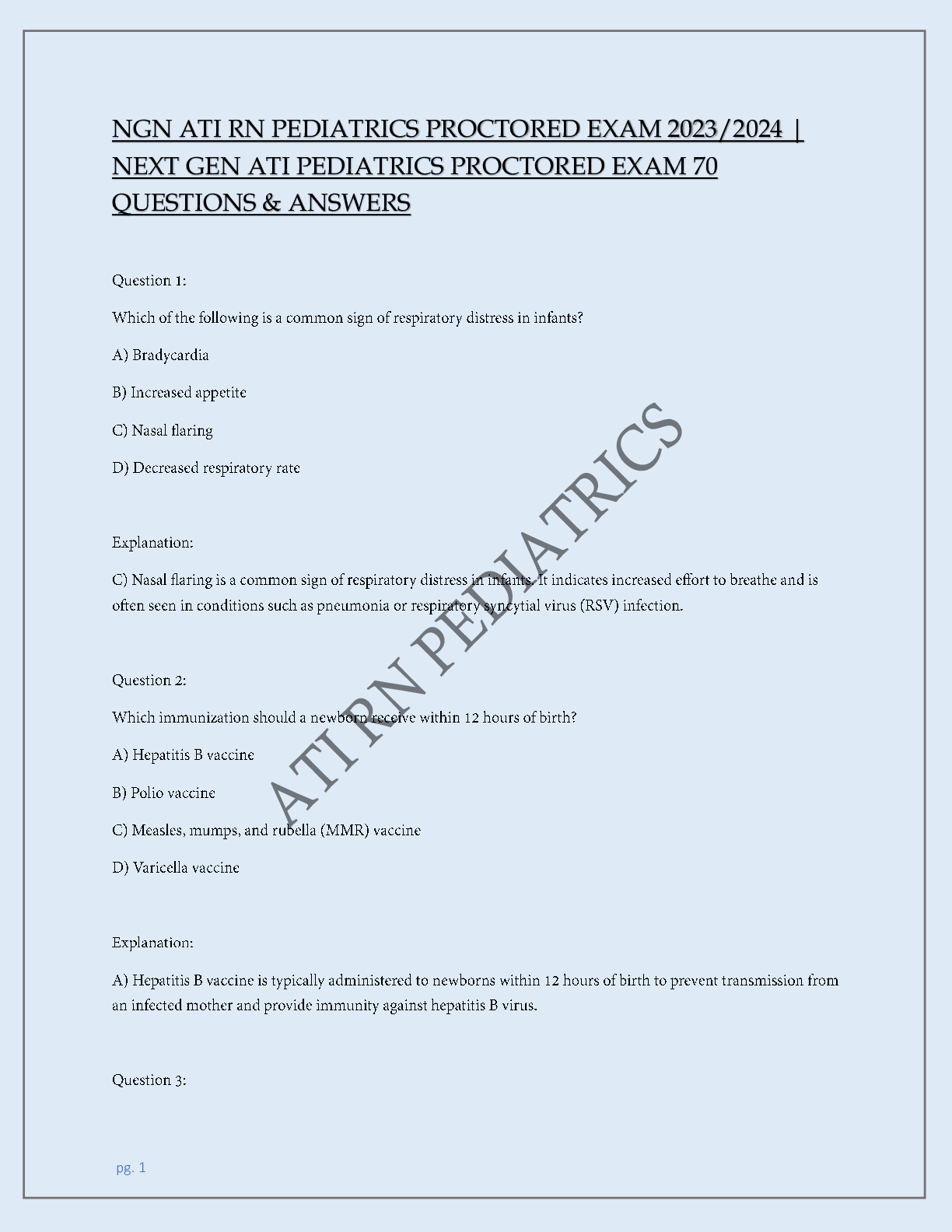
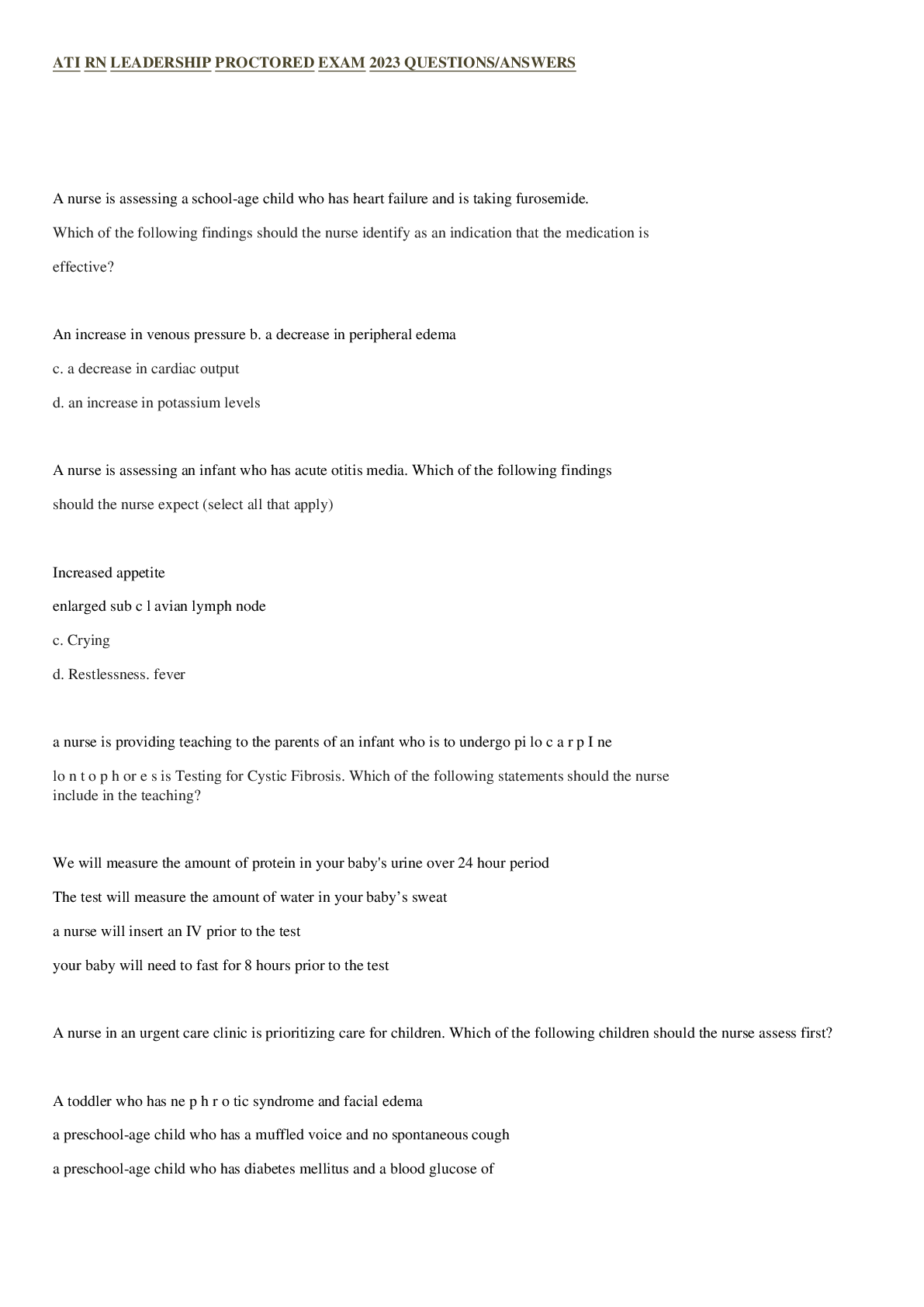
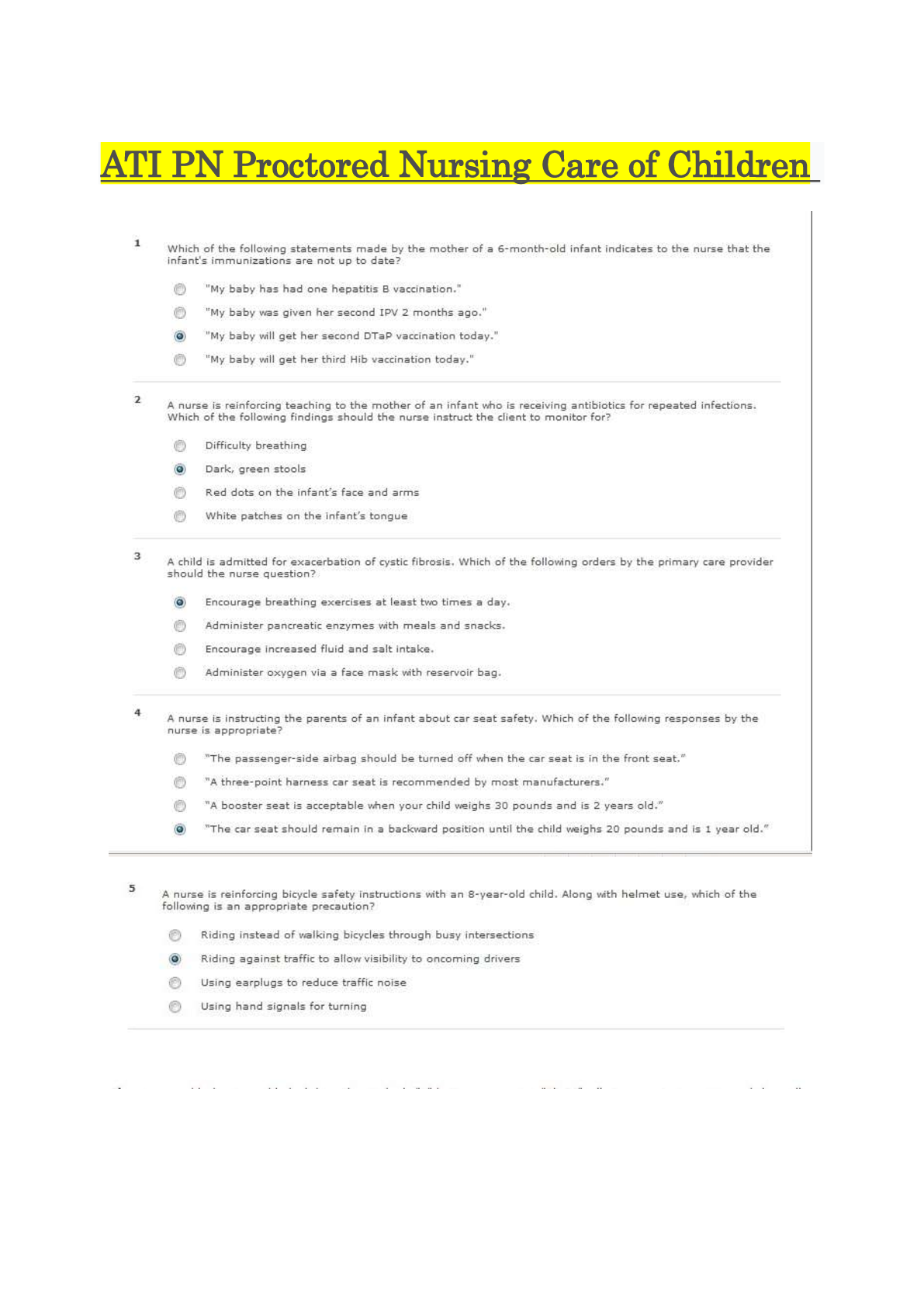
.png)
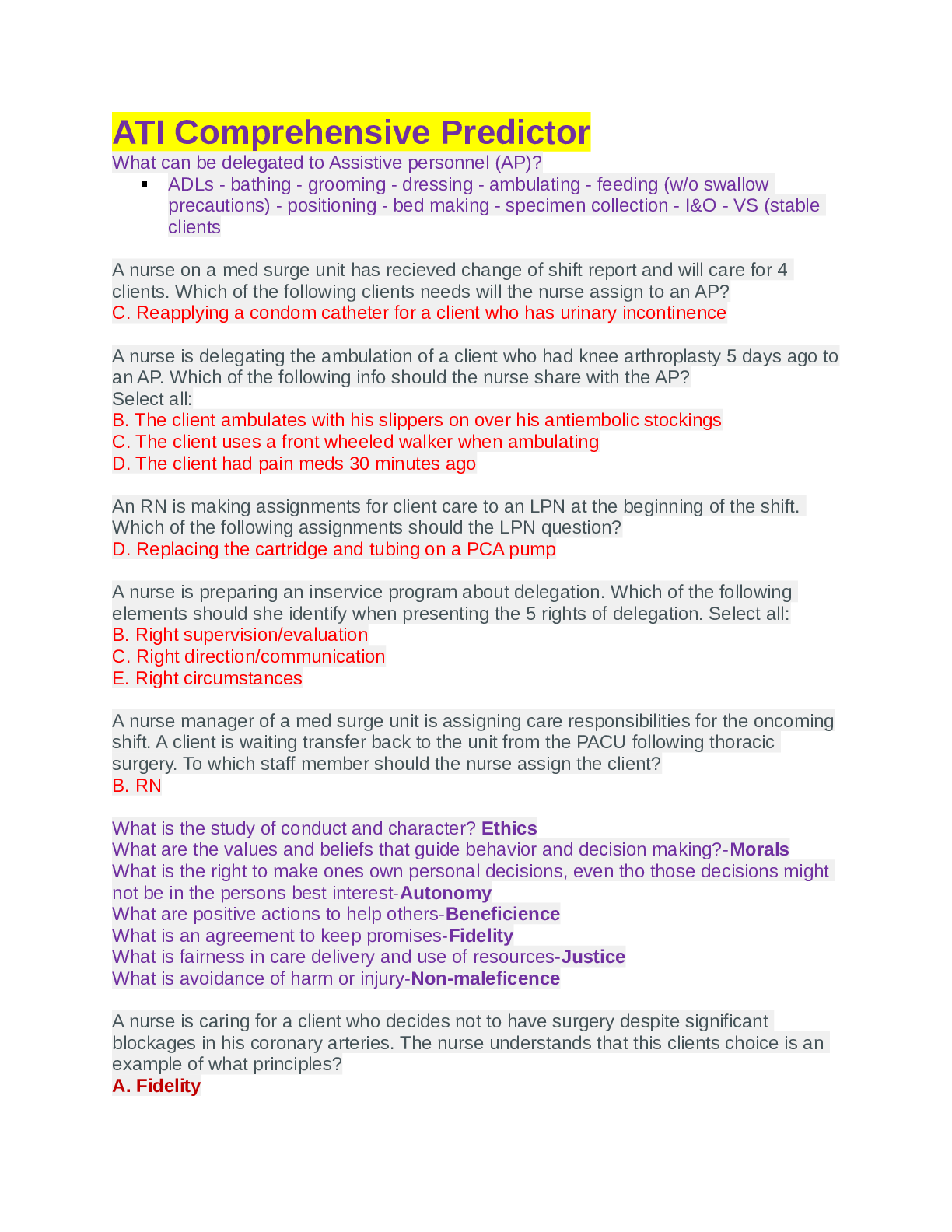
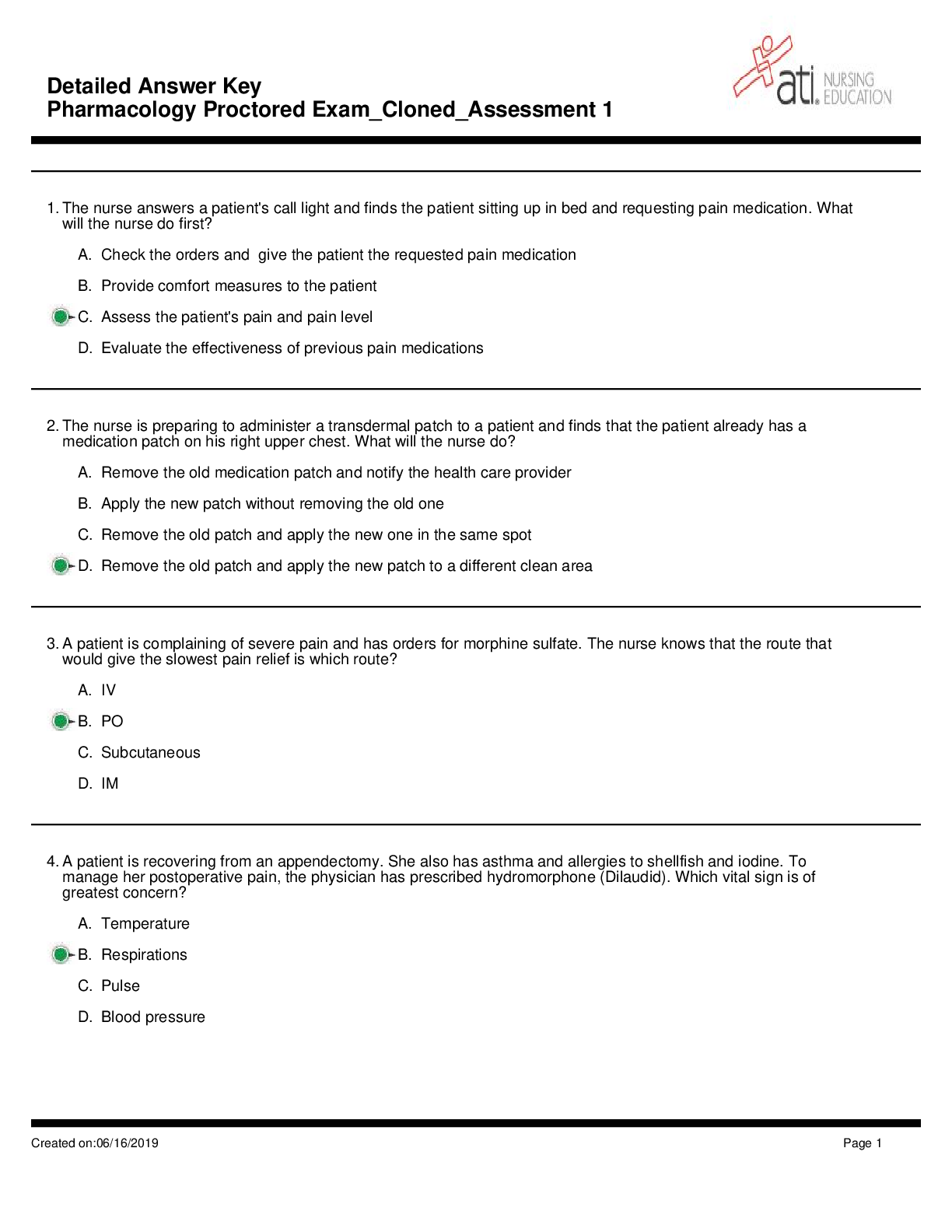
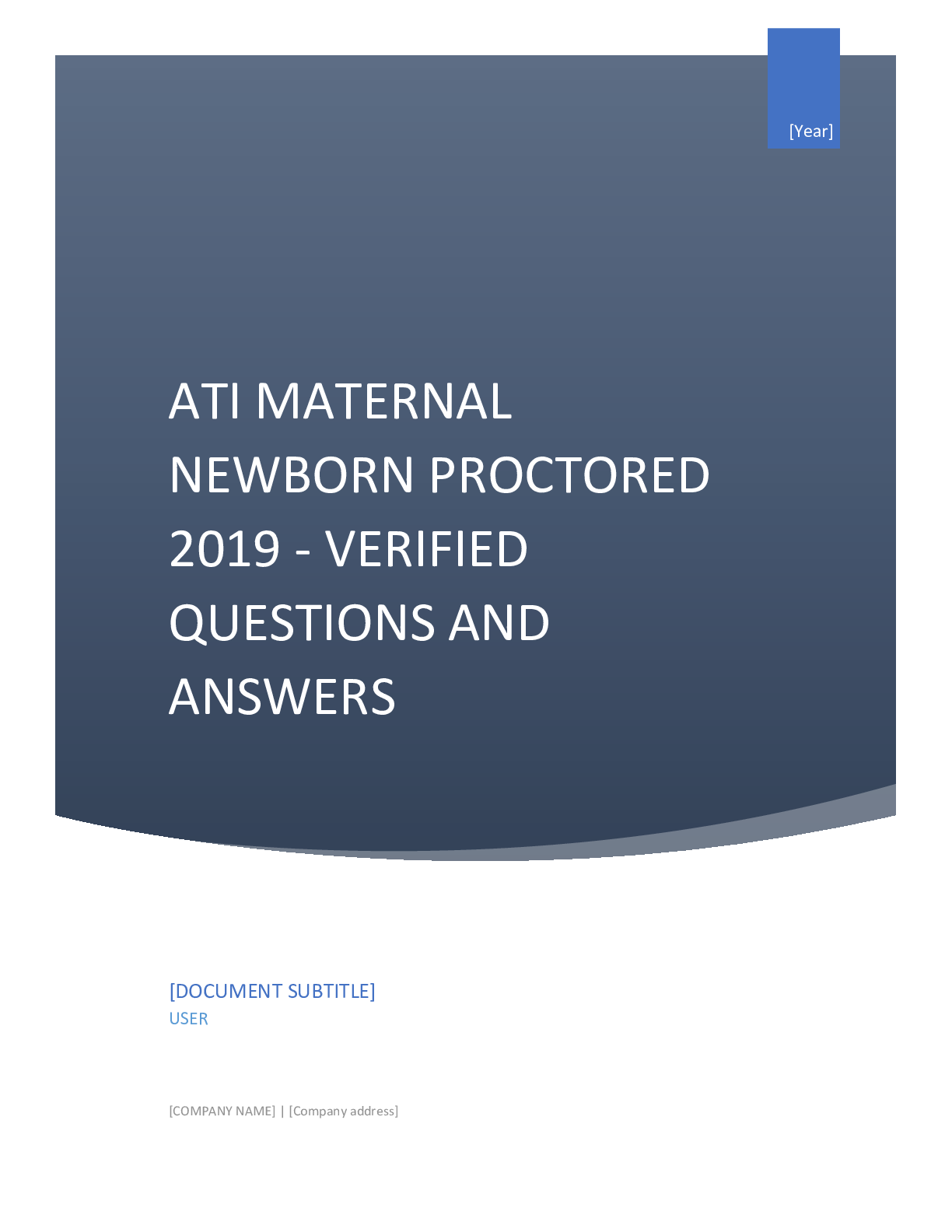
, Graded A+.png)
